Lions and Tigers
Legendary coach Ian Smith reflects on his career coaching
Oakham’s rugby stars and an emotional return to the pitch p36
The story of co-education and how it changed Oakham School forever p15

Finding the Right Formula
Ellie Slater (’13) talks about her career since leaving university, from race car engineering to milking cows p28
The Old Oakhamian Club Magazine
“So, the girls arrived.”
We would love to hear from you!

We are always looking at ways to improve the way we communicate with Old Oakhamians and really appreciate you taking the time to answer this short questionnaire.
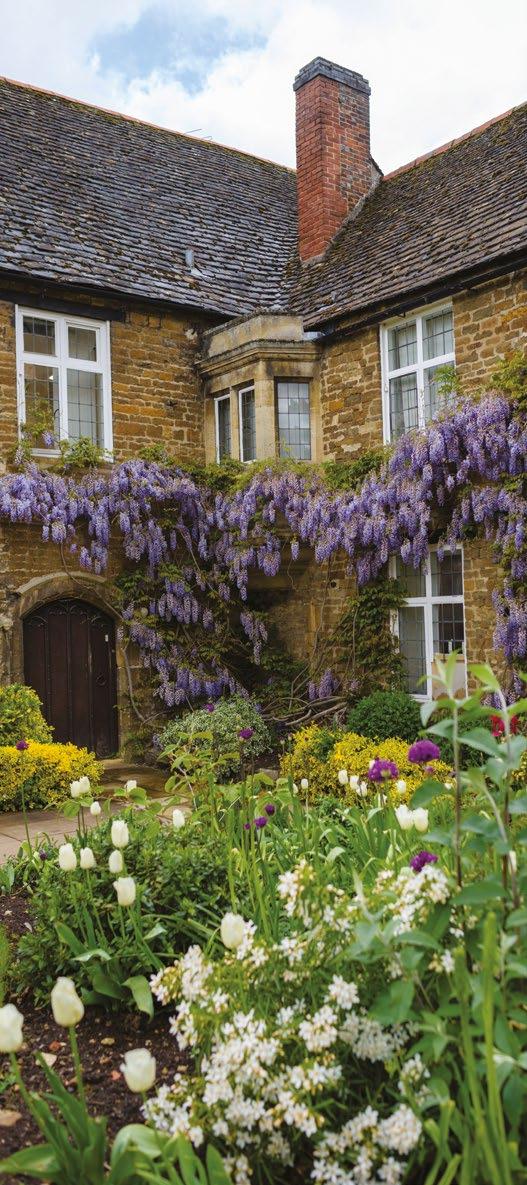
1 What content do you enjoy reading about?
2 How often would you like to hear from the OO Club and in what format?
3 What events would you like to attend?
4 If you were to donate to the School, what projects would you like to support?
5 Would you be willing to pay to receive a hard copy of The Old Oakhamian magazine?
Many thanks, Samantha, Joe, Asha and Charlotte Oakham School Development Team
in touch with our OO Community online: Become a member of our busy OO Facebook Page Follow us on the OO Instagram Page Sign up to The Oakham Hub for help with your career: www.thehuboakham.com Keep in touch with the latest OOs news via the OO newsletter
Keep
Scan this code or email us: OOClub@oakham.rutland.sch.uk
Leadership Editor and Alumni Manager
Joe Roberts jr@oakham.rutland.sch.uk
Managing Editor
Rachel Fairweather rf2@oakham.rutland.sch.uk
Director of External Relations
Samantha Rowntree sr@oakham.rutland.sch.uk
Art Director Sam Bowles sam@stencil-agency.co.uk
Designers
Stuart Jones studio@stencil-agency.co.uk
Kate Kusztal kate@stencil-agency.co.uk
Contributing authors:
Aurore Guillomot-Bonnefond (Archivist)
Asha Hickin (Development Manager)
Emily Howett (Communications Manager)
Charlotte Woodward (Development Assistant)
Production
Produced by STENCIL
Printed in the UK by Harvest Communications
Dear Old Oakhamians...
Where to begin my first column in the Old Oakhamian other than to say ‘Hello!’ It is a great pleasure to be the Alumni Manager of such a lovely OO community. While flicking through OO magazines of yore for inspiration, I found my introduction two years ago as beginning my ‘12-month internship’ with the Foundation. Oh, how times change, especially these past couple of years.
There are many thank-you’s to write, too many to mention here, but humour me as I list a few.
First and foremost, to my predecessor, Becca, who moved on to pastures new this summer. I owe Becca a great deal, not least for stewarding the OO Club through a tumultuous couple of years with great aplomb. Having sat across from her for two years (working from home, notwithstanding), I watched and learned much, and certainly wouldn’t be sitting here without her. She is dearly missed, but our loss is Oxford’s gain.
Rachel, our fantastic editor, without whom there would be no magazine at all, and whose talent, kindness and (nearly) infinite patience is more than anyone could ask for in an editor, colleague and friend.
Charlotte, my successor as Development Assistant, who has offered me so much support and friendship in her short time here, and who dutifully lets me play Beethoven in the office while we work.
Aurore, our brilliant Archivist, whose insight and knowledge of the School’s history has been beyond invaluable, and who very kindly pretends not to be annoyed when I interrupt her yet again to dig up another old photo from the Collection. I hope you will enjoy our collaboration on the 50 Years of Co-Education feature, on pages 15–23.
Asha and Sam, who have guided and supported me these past two years, and Emily, Louise and Will in the Marketing Department, without whom I would be at sea.
Conrad and the OSEL team, and Vicky and the Catering Team, without whom our events at the School would not be possible, and whose cakes from the Afternoon Tea I’m still dreaming about.
David Gilman (’89), who very kindly stayed on for another year as President (we will get your dinner, David, I promise!); Brian Welford and Jon Wills (’73), the founts of knowledge and wisdom of all things OO Club and Oakham, and whose visits to the office inevitably brighten the day.
And finally, my mum, Amanda (’77), my steadfast cheerleader, whose enduring love of her old school brought me to Oakham in the first place.
Researching the School for our feature, and 50 Years of Co-Education celebrations, has only reinforced my belief that this is a special place, a sublime School at which to live and work. Combined with my other hat as a School House Resident Tutor, it is easy to understand why so many OOs are filled with wonderful memories of these hallowed halls. It has been magnificent to have the return of the things we once took for granted – OO events, but also fixtures, concerts, plays, morning chapel, trips and activities, and being able to spend time with friends and colleagues without worrying too much about bubbles.
Certain Covid protocols still remain, which means I cannot say ‘just drop in anytime’, but we are able to welcome visitors with a little forewarning – so if you would like to visit, drop us a line and we’ll sort something out. Please continue to share stories, memories and news on the OO Facebook page, and with the OO Club.
I hope in due course to announce a number of different events and initiatives, so, as they say, watch this space. As an initial offering, I would commend to you the first edition of our new speaker series ‘Oakham Talks’ – ‘A Peek Behind the Curtain: A Conversation with Richard Hope and Sarah Moss, hosted by David Gilman’. It is available on our 50 Years of Co-Education webpage (see link below) and is well worth a watch.
Unfortunately, Covid struck down our Christmas Drinks at the last - we will try and reschedule them in the new year; the President’s Dinner, now long overdue, will be held in London next summer – keep an eye out for various invitations to come.
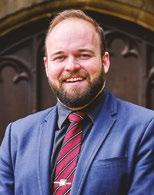
I hope to see you all very soon and until then, please keep in touch.
Quasi Cursores, Joe
oakham.rutland.sch.uk/about-oakham/celebrating-50-years-of-co-education @oldoakhamianclub
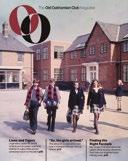
Search ‘Old Oakhamian Club’
The Oakham Hub: thehuboakham.com
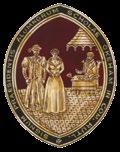
ON OUR COVER: CELEBRATING 50 YEARS OF CO-EDUCATION
A group of boys and girls walking between lessons outside Wharflands. Taken from “Sights and Sounds of Oakham School”, a collection of audio-visual material recording the events that took place during the academic year 1975–76 by Jim Bride.
To find out more about this collection, contact Aurore in the Archives: archivesuser@oakham.rutland.sch.uk
3
EDITORIAL TEAM
CONTENTS
FROM PUPIL TO DIRECTOR OF ADMISSIONS
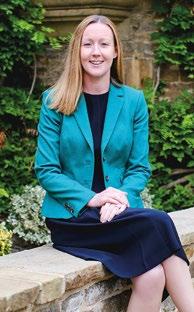
How Anna Steiger’s (’97) fond memories of Oakham determined her return.
THE CO-EDUCATION STORY
INTERVIEW WITH OO PRESIDENT
Our OO President David Gilman (‘89) talks about his plans for the year ahead, his memories of School and his career since leaving Oakham.
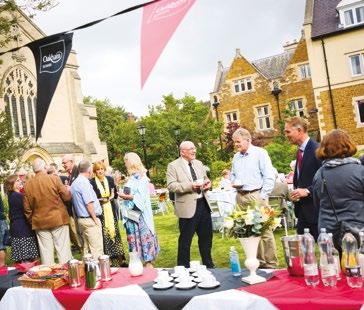
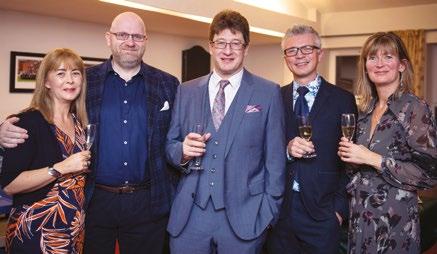
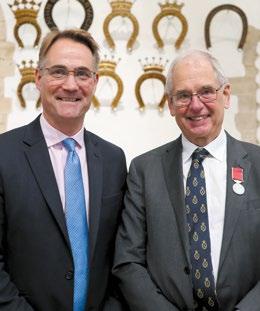
14
FAREWELL AND INTRODUCING…
Foundation telephone campaign. 24
We bid a fond farewell to Archivist Charlotte McCrory and meet new Archivist Aurore Guillomot-Bonnefond.
We delve through the Archives to look at the events leading up to the introduction of girls to Oakham School and the early days of co-education.
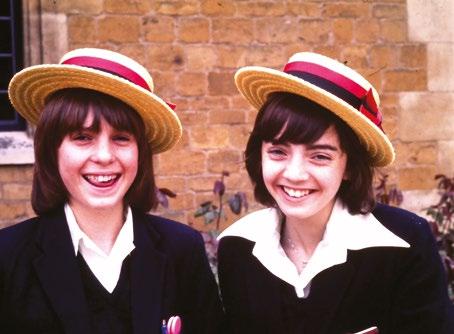
REUNIONS
Real life reunions make a welcome return.
6 NEWS
plus news
News of three births and a wedding;
of OOs in Sport and the Arts and the
06 10 15 12 24 10
15
12
4 CONTENTS
26
PROFILE OF NICK PRIESTNALL


Our inaugural Legacy Society President recalls his schooldays at Oakham and reflects on his career in teaching and fundraising.
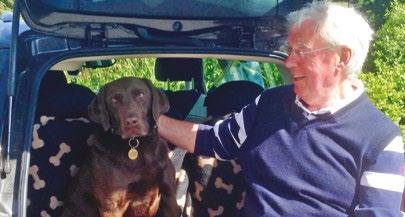
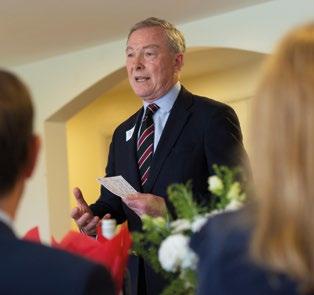
28
FINDING THE RIGHT FORMULA
Ellie Slater (’13) talks about her career since leaving university, from race car engineering to milking cows.

CELEBRATING 20 YEARS OF THE FOUNDATION

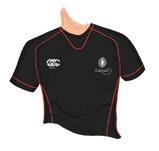

We take a look at the work of the Foundation since its inception in 2000 and its plans for the future.

32
FINE FORM
Artist Realf Heygate (’12) talks about his work and the group show in the Saatchi Gallery where it was recently featured.
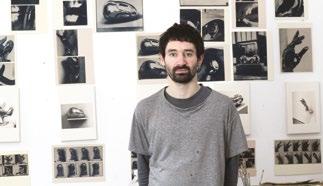
INTERVIEW WITH STEPHANIE BURLISON (’88)

1584 Society member, former pupil and parent Stephanie recalls her fondest memories of Oakham and her reasons for supporting the 1584 Society.
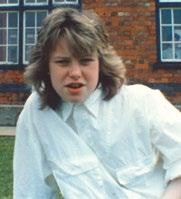
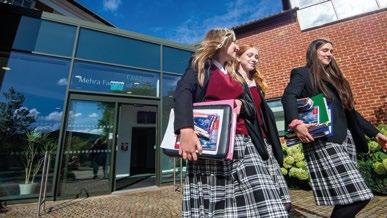
40 OBITUARIES

OO Death Notices and lives remembered.
36 THE LIONS, THE TIGERS AND THE YEAR RUGBY LOST
Legendary coach Ian Smith reflects on his career coaching Oakham’s rugby stars and an emotional return to rugby fixtures on Doncaster Close.
36
26 30 28 30
32 34 40
5
34
Sport
Rugby
▀ Hamish Watson (’10) had an incredible year, being named the Six Nations Player of the Tournament and selected in the British and Irish Lions squad for their tour to South Africa, which included a Man of the Match performance against the Sigma Lions. His fine form has continued this season and he was named Man of the Match as Scotland beat Australia 15-13 at Murrayfield in the Autumn Internationals. Hamish dedicated his Lions jersey to his former mentor Ian Smith, which can be found hanging in Chapel Close.
Read our interview with Ian on pages 36–39.
Cricket
▀ This summer saw a new feat for Oakham cricket, as three OOs played in the same County Championship match for the first time ever, with Tom Fell (’12), playing for Worcestershire, and Stuart Broad (’04) and Lyndon James (’17) for Nottinghamshire. Notts prevailed by an innings and 170 runs, with Stuart taking 5 wickets and Lyndon scoring 78 runs.

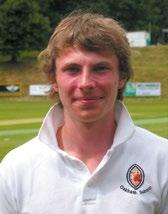
Lyndon had a breakout season, cementing his position in the Notts side with four fifties, and taking valuable wickets, including a first List A five-for. Lyndon recently extended his contract at Notts to 2024.
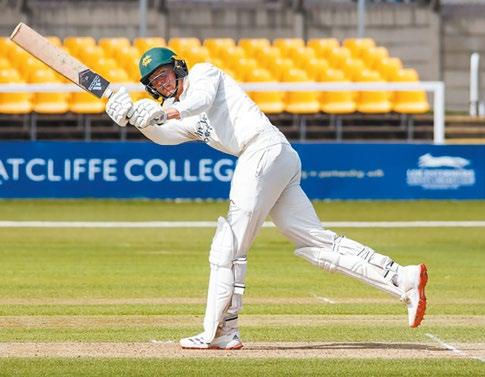
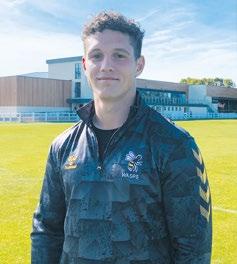
Meanwhile, Stuart has overcome a calf injury which had ruled him out of the final three tests of the summer to travel with the England squad for the Ashes down under. Best of luck, Stuart!
▀ Jack van Poortvliet (’19) led England’s victorious U20 Six Nations Campaign. Jack was named Player of the Tournament as he captained England to the Grand Slam. His good year has continued with some excellent displays for Leicester as the Tigers have made their best start to a season in Premiership history. Jack captained a 32-23 victory against Sale Sharks in the Premiership Rugby Cup in which his fellow OO Jacob Cusick (’21) (left) made his senior competitive debut for Tigers.
▀ Sam Costelow (’19) also played at the U20 Six Nations tournament, playing fly-half for Wales, including a stand-out performance against Italy, kicking 18 of Wales’ 25 points in the Cardiff rain. Sam has been in fine form for Scarlets, and was called up to train with the Wales senior squad earlier this year.
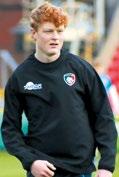
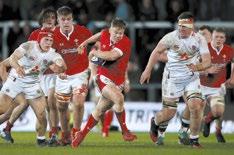
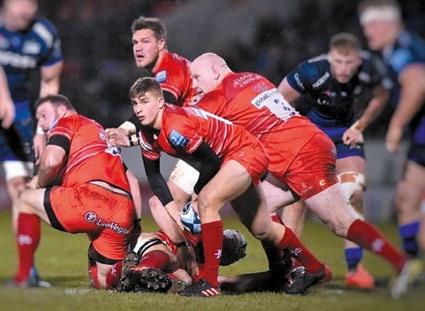
▀ Sam Wolstenholme (’17) (above) had a good season at scrum-half for Wasps, and captained his side in a Premiership Rugby Cup fixture against the Newcastle Falcons. ▀ Alex Goode (’06) returned from his loan spell in Japan to help Saracens get promoted back to the Premiership.
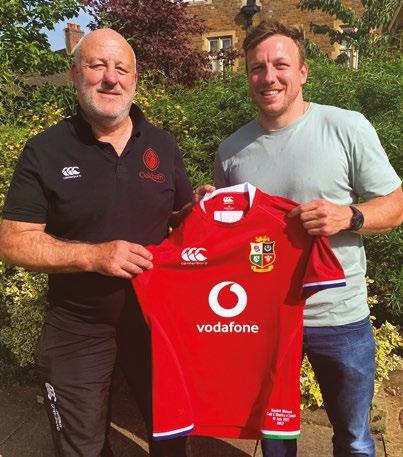 Stuart Broad.
Above: Tom Fell.
Right: Lyndon James
Stuart Broad.
Above: Tom Fell.
Right: Lyndon James
NEWS 6
Hockey
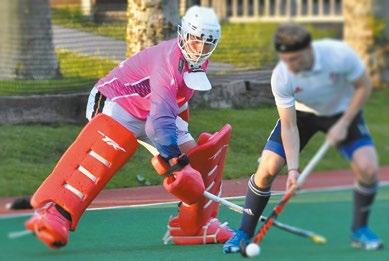
▀ Alex Stadler (’15) represented Germany at the Toyko Olympics this summer. Alex was the German men’s hockey team goalkeeper throughout the tournament, narrowly missing out on a medal as Germany lost 5-4 to India in the Bronze Medal Match. Alex is only the 6th Old Oakhamian to represent his country at the Olympic Games. Well done, Alex!
Births & Weddings
Shooting
▀ Congratulations to Rick Shouler (‘95), who has won the most coveted Target Rifle shooting trophy, the Queen’s Prize.
The competition took place at the National Shooting Centre at Bisley, and involved shooting at distances ranging from 300 to 1000 yards. Rick competed against shooters from far and wide and showed a superb display of marksmanship, securing the prize with a total of 298.35v (ex 300.60v).
Traditional celebrations saw Rick being carried off the range in a sedan chair to NRA headquarters by his peers. Rick now earns the right to have the initials ‘GM’ after his name.
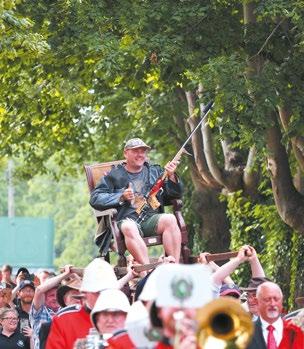
Wedding
▀ Maj Christian Oliver Lewis Wragg (‘01) VR HAC married Juana Camila Diaz Landinez on Saturday 12 December 2020 at the Guards Chapel, London. They welcomed a son in 2021 – see Births
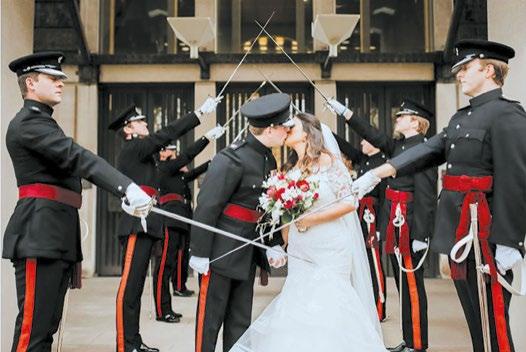
Births
▀ Christian Wragg (’01) and his wife Juana welcomed a son, Oliver Rodrigo Wragg on 21 May 2021.

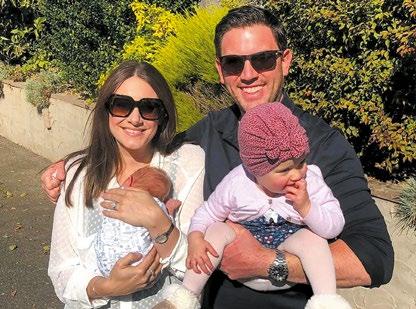
▀ Tom Wragg (‘07) welcomed a daughter Martha Jane Wragg, born on 30 October 2021 at Peterborough City Hospital.
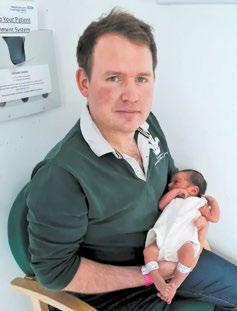
▀ Felicity
Stather (née Goddard) (’03) gave birth to a daughter, Cici Angela, born on 28 June 2018 and a son, Zachary Geoffrey, on 6 September 2019.
Christian Wragg and son Oliver
Felicity Stather
7
Martha Jane Wragg
The Arts
Honours
▀ We send our hearty congratulations to Peter Lawson (‘60), 1584 Society President, who has been recognised for his years of service to Rutland and beyond with a British Empire Medal (BEM) in the Queen’s Birthday Honours List.
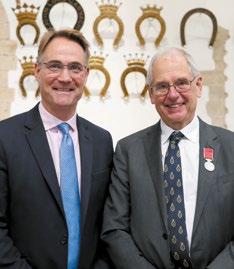
Peter was recognised for his service to the Arts in Rutland, and has been a generous supporter of the Arts, both within Oakham School and the entire Rutland community.
In the citation for the award, it said Peter’s “engaging and approachable style, matched by his selfless commitment to his causes, empowered others to rise to the challenge” of bringing the arts to life in Rutland.
The Proms
▀ This year’s Proms featured not one, not two, but three OOs performing, including the opening two nights of the Festival.
Daniel Hyde (‘98) kicked off this year’s festival as the featured soloist of the First Night of The Proms, performing Poulenc’s Organ Concerto His performance was praised by several major news outlets, with the Guardian commenting that he “tamed the beast that is the Albert Hall’s 9,999-pipe organ, revelling in the instrument’s possibilities yet always in conversation with the BBC Symphony Orchestra’s strings”.
The following night, Katie Hall (‘08), making her first appearance since becoming a mum, was
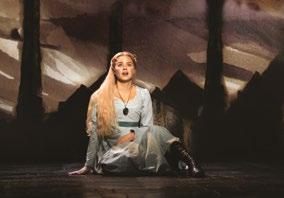
Richard Hope

▀ Richard Hope (’71) will feature in 1899, a new Netflix series from the creators of Dark, due to be released in 2022. Richard also stars in The Village in the Woods, ‘A love letter to 70s cinema’ from director Raine McCormack, available to stream or purchase on Amazon, iTunes, Sky & Virgin.
Sarah Moss
▀ Sarah Moss (’04) returned to the stage earlier this year, joining the cast of The Mousetrap for its West End re-opening. Following the success of last year’s Panto Online campaign, Sarah has also teamed up with director Peter Duncan once again, playing the Fairy Godmother in Cinderella Tickets are available at pantoonline.co.uk.
Sarah and Richard also joined OO Club President David Gilman (’89) for the first episode of our new speaker series, Oakham Talks, which is available to stream on the school website and the OO Facebook page.
one of a quintet of soloists for The Golden Age of Broadway, wowing the Royal Albert Hall with a selection of classic hits by Cole Porter, Richard Rodgers, George Gershwin, Frederick Loewe and Irving Berlin. Katie returns to the stage as Fantine in Les Misérables, playing throughout December at the Theatre Royal in Glasgow, the first stop of a UK & Ireland tour.
Dingle Yandell (‘00) completed the trio of performances when he joined Sir John Gardiner and the Monteverdi Choir as a soloist for a Prom featuring works by Handel and Bach.
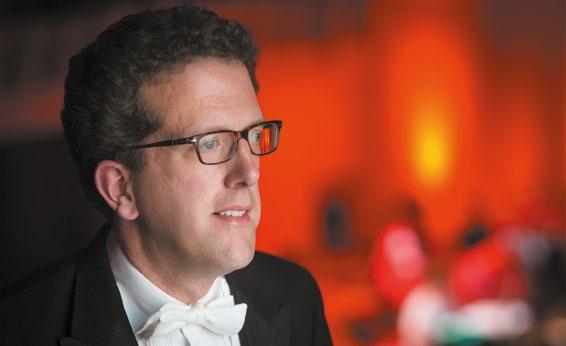
All the Proms are available to stream on BBC iPlayer.
Annabelle Apsion
▀ Annabelle Apsion (’78) returns as Violet Buckle in Season 11 of Call the Midwife, due out in January 2022. Call the Midwife’s Christmas special will air on Christmas Day, timeslot tbc.
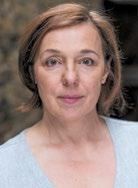
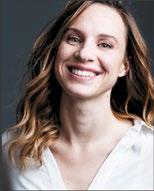
Matthew Macfadyen

▀ Matthew Macfadyen (’92) has returned to the screen as Tom Wambsgams for Season 3 of Succession, available on Sky Atlantic. Matthew was nominated for a Primetime Emmy for Outstanding Supporting Actor in a Drama Series in 2020 for his work on Season 2. He returns to the silver screen in Operation Mincemeat, playing Charles Cholmondeley, opposite his fellow Mr Darcy, Colin Firth, as Ewen Montagu, coming to cinemas on 14 January 2022.
 Harry Glynn
Dingle Yandell, photo by Michal Novak
Harry Glynn
Dingle Yandell, photo by Michal Novak
NEWS 8
Katie Hall as Fantine, photo by Helen Maybanks Daniel Hyde
Foundation News
Telephone Campaign 2021
Last August saw Oakham’s Foundation Telephone Campaign take place with recent Old Oakhamians having conversations with over 500 members of the Oakham community and raising vital funds.
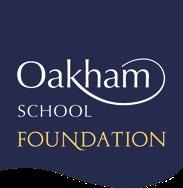
Anna Gonzalez
Anna Gonzalez (‘16) recently launched her new classical art print business ‘Aster&Selene’ and has donated two of her beautiful prints to Oakham School’s Classics Department.
Anna started the business as a ‘lockdown project’ and as a classicist and lover of design, she decided to create and sell products that honour the origins of the classical style. Aster&Selene is named after the moon goddess, Selene, and her son, Aster (the star).
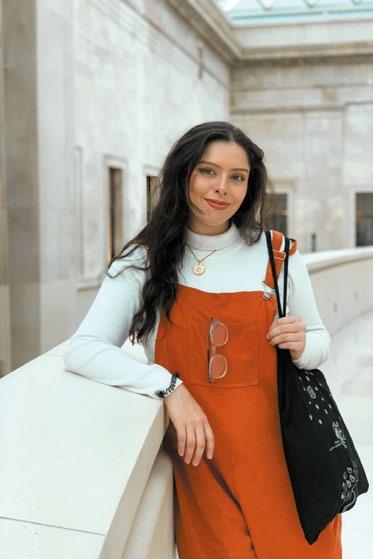
She writes: “I’m very conscious that Classics is largely inaccessible to most people, so this has been a big motivational factor for me. I wanted to create a brand for everyone and anyone to interact with ancient history – whether you know lots or nothing at all about it. I regularly chat through the artefacts I’ve recreated and why they’re important to the modern world.”
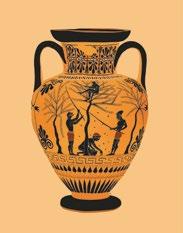
Anna draws everything digitally on her iPad and then her designs are printed onto premium art paper. All packaging is biodegradable (even the cellophane sleeves) and she has created a unique unwrapping experience with her own branding.

Anna’s prints are available to purchase via her Etsy shop on this link: www.etsy.com/shop/AsterAndSelene
Sea Girls
Sea Girls, featuring OOs Henry Camamile (’12), Andrew Dawson (’11), Rory Young (’11) and Oli Khan (’11), were able to get back on the stage this year, with Main Stage performances at Latitude, Reading and Leeds, Neighbourhood Weekender Festivals, as well as a sold-out UK tour in October. Their new album, Homesick, is coming out on 14 January 2022, which will be followed by a European Tour in the spring.

The callers explained the School’s fundraising projects, swapped memories, and gained valuable careers advice. They came away enthused by the many positive comments received, particularly after such a challenging 18 months.
OO and caller James Fairweather (’21) said, “‘It was interesting to hear about people’s experiences while studying during the 60s and 70s, while also hearing about aspects of the School that hadn’t changed - some of the younger Old Oakhamians even had the same teachers as I did! My communication skills improved during the campaign and I found helping to raise money for key projects and bursaries very rewarding.”
The focus this year was raising funds for SpringBoard Bursaries and the Foundation Project Fund. Bursaries facilitate opportunities for pupils who would not otherwise have access to an Oakham School education and SpringBoard Bursary pupils benefit immensely from the fantastic academic and co-curricular opportunities offered. The Foundation Project Fund enables smaller projects recommended by teachers and support staff that enrich the pupils’ experience inside and outside of the classroom. Read about this year’s Foundation Projects on page 10 of the Oakhamian magazine.
9
An Interview with


DAVID GILMAN (‘89)
OO PRESIDENT
Iwas blown away when I was asked to be President of the OO Club. I was at my 30-year Reunion back at School in 2019 – all I did was stand at the top of the steps and thank the people who arranged the reunion. I had no idea what it would entail. Jono Wills, in his typical laid back style said: “being OO President is whatever you want it to be.”
I think that is turning out to be true. I see the role of OO President as an opportunity to visit Oakham and really use this message to offer encouragement, tips and advice to current pupils – particularly those interested in Drama and Media. I believe I am also the point of contact in trying to encourage the continuation of reunions within the OO community, bringing friends together and sparking enthusiasm for the OO Club in people who might not have previously considered making it a bigger part of their lives - particularly when it comes to promoting events, such as the OO Dinner.
I had a little bit of a prejudiced view in the past about attending OO events. I felt maybe they would be a bit too old fashioned and wouldn’t necessarily appeal to me. It is important to me that we don’t alienate those who have shown their loyalty and passion for the School over many decades, but I believe it is important to introduce our more recent OOs to the benefits of keeping in touch, together with showing them the fun you can have!
I was a bit apprehensive about going along to our 30th Reunion, because I wasn’t sure how I would feel going back and meeting everyone again. Actually, it was amazing. It rekindled all those memories and as we stood in BAFS raising a drink, that whole relationship was completely reborn. Now, I
We are delighted that David Gilman (‘89) is continuing as our OO President for the forthcoming year. We talk to him about his plans for the year ahead, his memories of School and his career since leaving Oakham.
Written by Becca Maddocks and Charlotte Woodward
OO PRESIDENT INTERVIEW
Above and right: David Gilman, in the centre of the action, at Sky News
10
keep in touch with loads of OOs and meet up every six months or so and I closely keep in touch with quite a few of them now. It was a real turning point. For anyone who is remotely unsure about going to a reunion, I would say just do it.

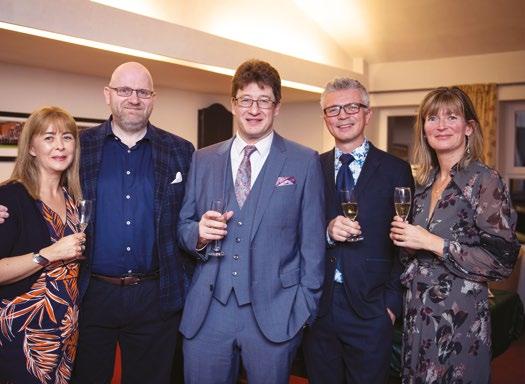
My favourite memories of being at the School are from the time I spent in the theatre. I spent so much of my time swinging from very high bars, hanging off ladders with a light in one arm and gripping on for dear life with the other arm. It felt like a family in the theatre, whether that was the backstage crew, the staff, or the actors. I have so many fond memories of time spent with them. My absolute favourite memory was when we toured a play, The Accrington Pals, around New England for two weeks. I believe this was the first time Oakham had taken a play on tour. As part of my A-level Design, I designed the set and then I did the lighting.
After leaving Oakham I went to Plymouth Polytechnic, as it was known then, and started a degree in Communications Engineering which is as interesting as it sounds. I had a ball in Plymouth and I wouldn’t have missed that year for the world, because socially it was great and that helped me to grow as a person. I spent a year partying and not working very hard, whilst applying for jobs – predominantly at the BBC. I decided at the end of the university year that I was better off leaving my course, as it wasn’t even remotely relevant to what I wanted to do. I then managed to land a job as a trainee technical operator at TV-am, who were the predecessors to Good Morning Britain, and there I got to do studio cameras, editing, VT (so playing all the tapes, as they were in those days), and vision mixing (which is like having a giant remote control that can cut between all the cameras when the Director shouts or clicks his fingers…). After that, TV-am lost their ITV franchise which meant that we all got made redundant. When one door closes, another door opens – Meridian, who still have the franchise for ITV in the South. I managed to get a job there, again, as a technical operator. It was here that I focused on my vision mixing and directing. I started by directing short 5-minute bulletins for ITV local news when the main director was on leave, so that was a great opportunity. A full-time directing job came up in Meridian in Maidstone, Kent, so I was Senior Director there. When they decided to shut that studio down, I applied for the job as Director at Sky News, and I have been there ever since.
I’ve been at Sky News for 16 years now. There are two aspects to my role. My day-to-day job is directing the output; in the gallery, the main control room, you have two key figures who run things. The Output Editor – they act as a producer who is in charge of the editorial side of things. They will decide which story you are going to do and how long you are going to allocate to each story and each interview – the presenter’s angle of the tack. Then the Director makes it happen. I call every shot, decide how each camera is framed up and which graphic to cut to. I knit the whole thing together and make sure it goes on air.
The other side of my role is that I manage seven other directors. I try to develop their careers and enhance their skills as directors, giving them opportunities so they can grow in confidence and experience.
Right:
My advice to current Oakhamians and Old Oakhamians who would like to get into the Media: be tenacious and decide in your mind that it is not a matter of ‘if’ but ‘when’. From the age of 14, I wrote randomly to the BBC, not knowing who would get my letter, saying that I wanted to be a camera man. I was absolutely determined that I was going to be a camera man. There was a guy who wrote back to me – once I had his name, the poor bloke received a letter from me every six months. I would say something along the lines of: “hello, I’m still interested, I still want to be a camera man.” And he would write back to say: “hello, I’m ever so sorry but you’re still not 18 – write back when you’re 18!”. When I was 18, I got a series of job interviews at the BBC, for a role as a trainee camera man. I was progressing really well through the series of 3 interviews, got to the third one and I completely messed it up and didn’t get the job! Thankfully, TV-am gave me a job instead and it all worked out okay in the end.
My other advice is ‘be yourself’ – people’s personalities always shine through. When I have given people jobs in the past, it has not always been the people with the most experience that I have taken on. Once someone shows their enthusiasm and their eyes light up, and they demonstrate that they are really interested in, and excited about what they want to do, then that will get them through. I think that’s the main thing that Oakham gave to me – the confidence to believe in myself. Exams will put you in a good place, however as somebody who did terribly in exams, I strongly believe it’s about the overall person and their personality and their enthusiasm that will see them through.
Above: David at the 2019 OO President’s Dinner
11
On tour with the cast members of The Accrington Pals
My absolute favourite memory was when we toured a play, The Accrington Pals, around New England for two weeks. I believe this was the first time Oakham had taken a play on tour.
FROM PUPIL TO DIRECTOR OF ADMISSIONS: How Anna Steiger’s fond memories of Oakham determined her return
 Written by Emily Howett
Written by Emily Howett
12 ALUMNI INTERVIEW
Stepping back onto Chapel Close some 24 years after leaving, OO Anna Steiger (née Hickinbotham) (‘97) has made a very welcome return to our campus as Director of Admissions. As one of five siblings having attended the School, Anna’s fond memories of life at Oakham run deep and her new role will see her welcoming pupils just like herself to the Oakham family. We caught up with Anna to discuss her past, present, and future with Oakham School.
The lessons I learnt at Oakham have stayed, and will stay, with me for life. My connection with the School has made me who I am today. Learning to never give up and to keep trying when things get tough is something that I’ve really learnt to value in my years since leaving the School. Perseverance and hard work are at the core of Oakham and they are encouraged from the moment you join. The work ethic that it’s OK to fail and try again is something that I want to now pass onto my own children.
There’s always a buzz of something happening at the School and that’s still very true today. I always felt very involved in the Oakham community and was very drawn to the family feel you get when you walk through the gates. The School hasn’t changed much since my time here; it has still got the same great atmosphere and it’s fantastic being back. Many OOs have a huge affection for Oakham and a number of pupils I went to School with now have children of their own here. I think people have very positive experiences of life at the School, which resonate with them long after they leave.
Oakham’s versatility ensures it’s a home for all; no matter what your interests may be. My four sisters and I all went to the School and whilst we all had very different interests and aspirations, Oakham catered for each of us individually and allowed us to succeed in our own interests. The same will be said for my three children; Bella (9), Thomas (6) and Mathilda (22-months-old) when they come to the School because whilst I know each of them will begin to carve their own pathways as they grow up, they can come here and experience all of the amazing opportunities I had growing up.
My shy personality didn’t last long when I arrived at the School. Initially quite a reserved young girl when I joined, the sociable opportunities I had at Oakham were outstanding and really helped to bring me out of my shell. We were always able to mix with other pupils inside and outside of the classroom and you always felt like you belonged. A lot of the time we’d be socialising in an academic manner, as I remember going to my friend’s house for a Medieval banquet as part of the History Society, which was so much fun.
The thing about Oakham is, you know the teachers aren’t just here for a job; they’re a big part of the School. They care about their pupils greatly and you know that to them this isn’t just another job, as they really absorb the School atmosphere and provide a sense of fun and genuine happiness. My History teacher Mr Temkin was always a firm favourite for me and my friends, because he used to buy us treats from Strickland’s Bakery on a Saturday morning before one of his lessons.
Some of my fondest memories include my time in Chapel, playing lacrosse and participating in athletics and the lifelong friendships I made, which I still cherish today. Singing in Chapel and during Congo are some of my favourite memories and it has been lovely to witness recent Congo events and know the tradition is still as thriving as ever. I was also very into sport and loved doing athletics throughout my time at Oakham. I used to volunteer to help the Lower School with running their events as part of my Duke of Edinburgh’s Award. I loved lacrosse too. The friendships I made through sport, classes, my Houses and from being in the School environment were significant.
Monty the School python was always a lot of fun in our classes and it’s not something you’d see in today’s lessons. It seems funny to remember this now, but Monty was the School python and used to slither around the Biology classroom during our lessons. It really felt like he was our School pet, and everyone knew him well - with a lot of pupils even giving him regular cuddles!
Oakham isn’t just for the pupils; the parents love their involvement in the School. Whilst Oakham was a fantastic place for me and the other pupils, many of our parents had, and some still have, great connections with the School. My mum is part of the Choral Society and comes back to the School to sing in Chapel. Our School Chaplain, Rev Darrall is also the one who christened me and prepared me for my Confirmation. Later on, he officiated my wedding ceremony, just showing how deep our connections to the School run.

Independent Schools have always been in my life and I’m proud to be where I am today. After I left School, I still wasn’t sure what I wanted to do so I took a gap year where I went to Sydney and ended up working for a boarding school out there. Then after my Geography degree at Manchester University, I worked in Media Sales for Hobsons. It was here that I ended up working on the Hobsons Guide to UK Boarding Schools (now known as Metropolis) and became its publisher.
Life is co-educational. Having worked for Queenswood, an all girls’ school and Bedford, an all-boys’ school, it has been fascinating coming to a co-educational school. Oakham does co-education very well and it has a great balance of everything. There are good equal opportunities for everyone, and the School is truly 50/50 rather than it being an afterthought. Oakham is known for being a leader in its field and we’re not afraid to challenge ourselves.
We want Oakham School to represent an inclusive community which nurtures happy and aspirational children. With many different entry points available to join the School, our complex and diverse admissions process is unique. We provide an education for boys and girls who are local, national, and international, with a breadth of subjects and co-curricular activities. We treat pupils as individuals and recognise that our 50/50 split of day and boarding pupils and our 50/50 split of girls and boys is a key dynamic of Oakham. Above all, I believe we’re defined by our all-round opportunities; our role at Oakham is to encourage children to try new things so that they can discover where their strengths and passions lie.
Ancaster House photo in 1990–1991 academic year. Anna is in the second row from top, second from right
Farewell to…
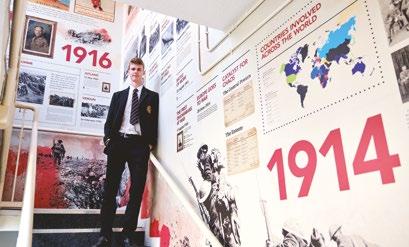
Ms Charlotte McCrory, School Archivist
Written by Aurore Guillomot-Bonnefond
This summer we said farewell to Charlotte McCrory. Charlotte joined Oakham School in September 2018 as the School Archivist.
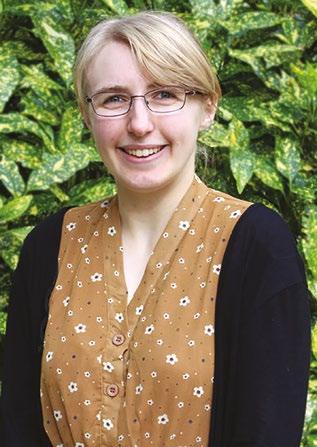
In her first week, she embarked on a time-pressing research project for the Library, designing educational material on the WWI soldiers. It could not have been a more hectic start to a new job! From her first term in College House, Charlotte aimed at promoting the Archives’ rich collection to a large audience of pupils, staff and Old Oakhamians. Collaborating with the Library or the Marketing Department, she creatively set up new exhibitions around the School campus. We all remember the posters for the WWI centenary and the 25th Anniversary of the Smallbone Library display. Her enthusiasm and passion for the history of the School boosted the interest of external researchers and other school archives in the work carried out at Oakham.
The list of all the innovations and changes Charlotte brought to the Archives is extensive, but special mention must go to her collaboration with the History Department to create wall art on OO involvement in WWI, the Archives’ social media presence and blog posts, the Libguide website and the new catalogue AtoM – accessible to all online. In the office, Charlotte started a long-term reorganisation project, facilitating research and access as well as better care for the most fragile items in the Collection.
We wish her all the best in her new position as the Learning Resources Manager at Derby Cathedral School.
Introducing…
Miss Aurore Guillomot-Bonnefond, School Archivist
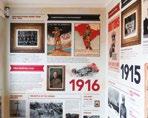 Written by Joe Roberts
Written by Joe Roberts
It is with great pleasure that we introduce our first-ever full-time Archivist, Miss Aurore Guillomot-Bonnefond. Known affectionately by her tutees and pupils as ‘Miss G-B’, Aurore has worn several hats at Oakham in her five years at the School.
Having read History and English Studies at Université Blaise Pascal, Clermont-Ferrand, Aurore arrived in 2016 as a French Assistant. In 2017, having stayed on for a second year in the French Department, she joined Rushebrookes as a Resident Tutor, where she resides to this day. In 2018, she began to split her time between the French Department and the Archives, joining as Assistant Archivist, before making the swap permanent in 2019 (although that hasn’t stopped the French Department from calling on her experience from time to time, particularly during the first lockdown).
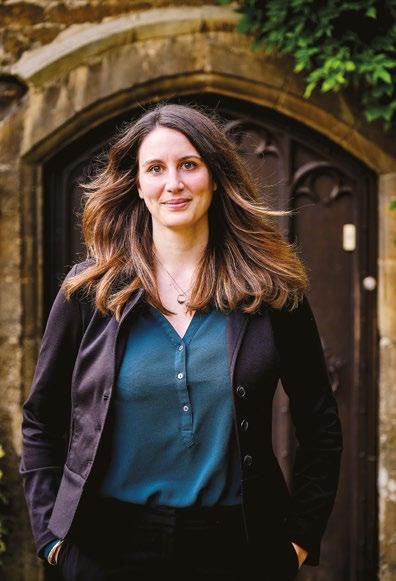
A keen and talented historian, she has stepped into the role of School Archivist following Charlotte McCrory’s departure. Their joint custodianship included a major research project on Oakhamian WWI soldiers, as well as exploring and expanding the Collection, and bringing the Archives up to industry standards.
In her budding sole proprietorship, Aurore hopes to continue the fine work of digitising the Collection and bringing the catalogue online, thus making it more widely available to Oakhamians and Old Oakhamians alike. She hopes to work closely with the OO Club, having experienced first-hand the love and passion OOs hold for their old school, as well as providing stellar educational materials so that current pupils will benefit from the School’s rich history.
Aurore came to England having always liked the language, culture & history (c.f. her university degrees!) and wanted to spend more time in Great Britain, having crossed the Channel for various holidays. She didn’t imagine she would still be at Oakham five years later, but has loved her time here so far, especially tutoring and spending time with the Rushebrookes girls.
A keen rugby fan and an avid reader, she is also a talented baker, as the Rushebrookes girls and tutors would no doubt attest.
Congratulations Miss G-B; we wish you every success in your new role!
14 FAREWELL AND INTRODUCING…
Below: The WWI wall art in the History Department
Co-Education at Oakham School A Brief History
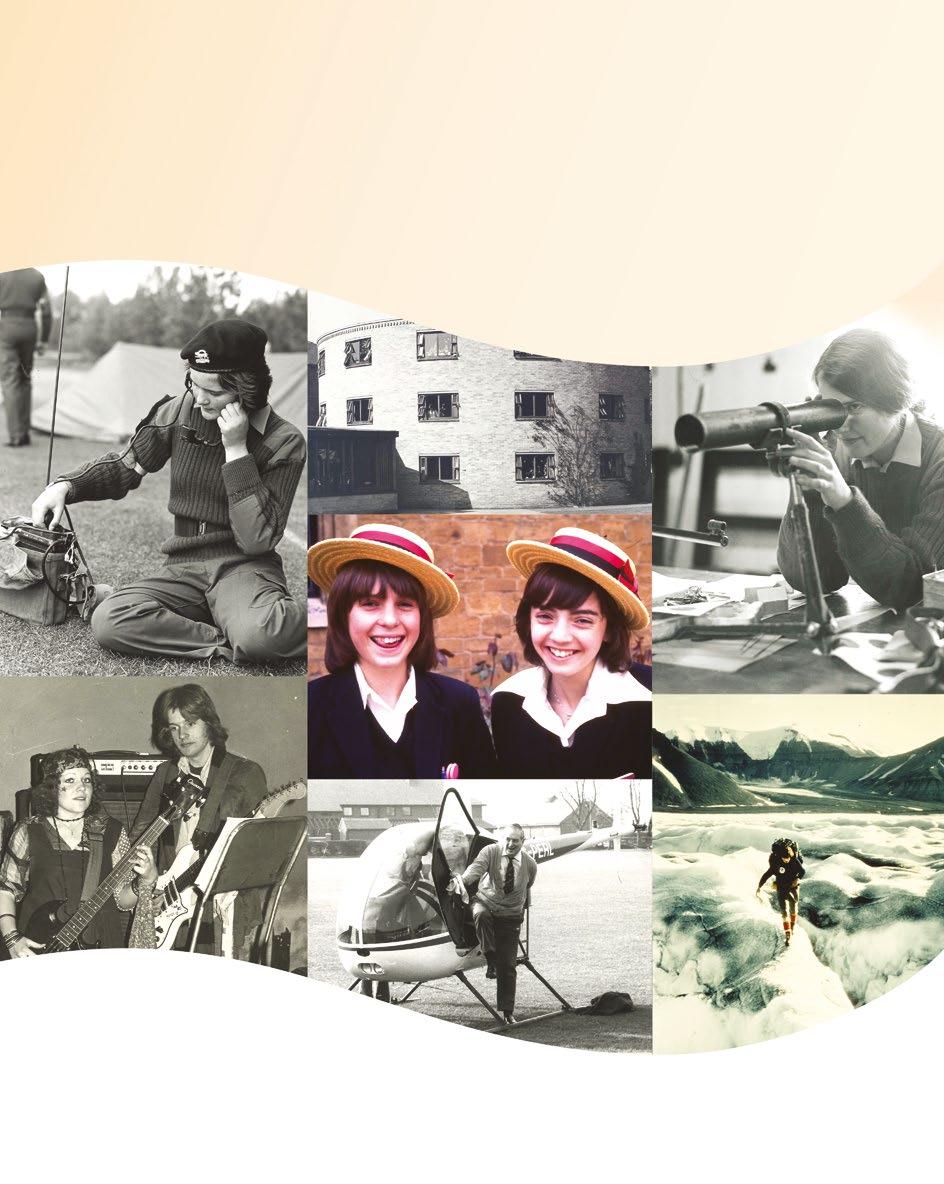
A school should be co-educational because education must prepare for life
John Buchanan (JDB) writing in his memoir Operation Oakham in 1990
Written by Joe Roberts and Aurore Guillomot-Bonnefond
15 ARCHIVES | CO-EDUCATION AT OAKHAM SCHOOL
The Decision
The years 1970 and 1971 marked two major milestones in Oakham School’s history, the most significant since 1584, and brought about tremendous and irrevocable changes to the course and nature of the School – returning to full independence and accepting girls into the School.
In the 1960s, the Labour Government sought to bring about the end of the Direct Grant and the grammar school system, which Oakham had been a part of since the time of Sargant’s headship. Buchanan decided to pre-empt the end of the Direct Grant, which accounted for a large proportion of Oakham’s day boys, and he worked toward moving the School back to full independence – a proposal met with outright hostility by the Local Education Authority. Despite the LEA’s staunch resistance, the Oakham School Trustees voted to return to independence on 1 September 1970.
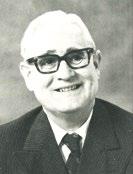
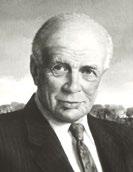
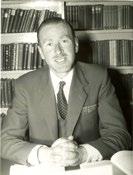
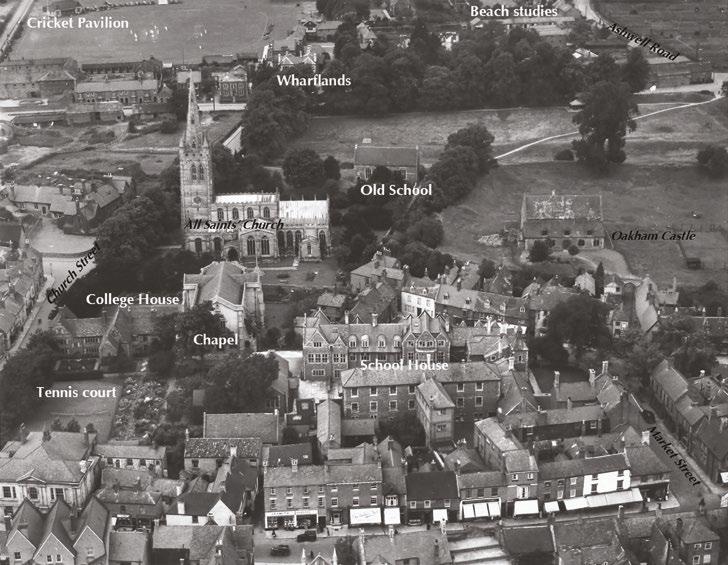
A cynic might suggest that the subsequent move to co-education was a purely financial one, coming as it did so quickly after the decision to forego the Direct Grant and its
subsidies. They would be partially correct, although there were in fact many non-financial reasons, perhaps less pressing but no less important, that complemented the overwhelming financial necessity.
Buchanan had for some time been ruminating on the limitations of single-sex education, feeling as though it was particularly deficient when it came to preparing for life after Oakham. He felt, too, that girls would have a “civilising effect” on the School as a whole. This was in keeping with his general outlook on the School’s character, having made a concerted effort in his tenure to that point to phase out lingering Edwardian public school tendencies, such as corporal punishment and fagging. And, with a fee increase of 25% to offset the end of the Direct Grant, Oakham needed to stand out, and being fully co-educational offered a unique opportunity.
In all the wrangling with the LEA, which had included a rejected proposal by the Trustees to merge with the girls’ Rutland High School, the idea of co-education had been planted and had taken root in Buchanan’s mind. The triumvirate of the Headmaster (JDB), Chairman (Tom Haywood) and Bursar (Trevor Case), began co-education consultations, and Buchanan approached the Housemasters with trepidation about the proposal. He found them surprisingly supportive, and buoyed by their backing, Buchanan prepared for the Trustees.
Below, from left to right: John Buchanan, Trevor Case, Col Tom Haywood
The earliest recollection is of the ease in which co-education was introduced. As I recall, a special staff meeting was held when JDB, ever the master at marketing an idea, announced, “We shall be taking girls into the school next year.” This was accepted without much question. As we left the meeting there were some mutterings that such a step would widen the gap between ourselves and the Uppinghams of this world [and] weaken our chances at competitive sport. Most of us were full of eager anticipation.
In 1971, the Editors of the Oakhamian sent out a questionnaire to the prospective female pupils. Below are some responses they received and published in the Summer 1971 Oakhamian
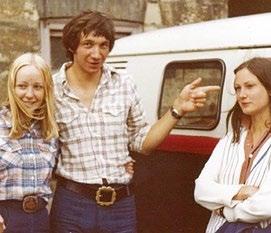
• WHY DO YOU WISH TO COME HERE?
“I had already decided that I wished to leave my present school, as it shares with many other girls’ boarding schools a certain narrowness of outlook, which despite many 6th form privileges becomes more confining as one progresses up the school…”
• HOW DO YOU THINK YOU’LL BENEFIT?
“There are many ways in which I think I will benefit from this – the atmosphere for teaching A-Levels is probably better in a boys’ public school, and it will have more varied and interesting activities to offer. Although girls’ schools have drama and music, they sound much more inviting in the pleasant ambience of Oakham…”
• HOW DO YOU THINK YOU CAN CONTRIBUTE TO LIFE HERE?
“I hope I can contribute to the social life by making a mixed society which, after all, is the normal way of life.”
The idea had clearly also stuck in their minds from the earlier independence discussions, for it was with remarkable alacrity, only four months after the independence vote, that the Trustees resolved to accept girls in September 1971.
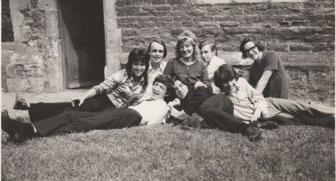
With the staff and Trustees now committed, the focus turned to the practicalities of such a momentous decision; primarily –where to put said girls? College House, at that time the home of the Oxbridge candidates, was deemed a suitable arrangement for a small cohort, until such a time as purpose-built accommodation was completed. Other considerations needed to be made, first and foremost the uniforms, ever a popular topic among school staff, and perhaps equally divisive - the use of Christian names instead of surnames in the classrooms.
Uniforms finally decided (a tartan skirt and dark blazer), first names permitted in the Red Book, and a suitable home found, they now needed some girls. At that time, Oakham was still establishing itself on a national level and its pulling power remained limited; thus, convincing families to send their daughters proved easier said than done. With three months to go, there were only two applicants. But with the assistance of an agency, those numbers swelled over the summer, and 17 boarders and 10 day girls entered College House on 5 September 1971.
I remember meeting with JDB to make sure the transition was a success with no reasons to object from parents, public or mainly staff. We had an amazingly ambitious and open working student/headmaster relationship; he said he felt I had the trust of the school. He wanted to move fast and decisively. He encouraged me to abolish any unnecessary rules at the first School Council meetings regarding privileges of seniority that were based solely on tradition and obviously outdated. Passageways that only year 5 and above could use went the first week. We quietly had to win over staff who had concerns over ‘relationships’ being a distraction to learning [and] the school bar being a den of iniquity. Many seemed sure that it wouldn’t work beyond a senior school system. But what Oakham managed was a complete transformation within a few years as each new girl year intake worked its way up through the school system. JDB had a large family himself and was sure students could behave in an adult way given the opportunity.
Richard Hope, Head Boy and Chairman of the School Council, Winter 1971
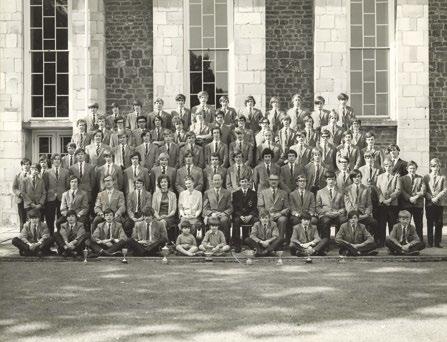
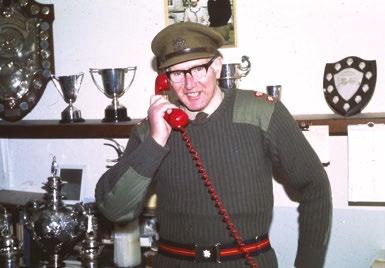 Mike Stevens, Teacher at Oakham School 1957–1993
Above: Michael Stevens.
Right: Photographs sent by Richard Hope With Alison Hattersley (1971-1972) and outside Old School in summer 1970
Mike Stevens, Teacher at Oakham School 1957–1993
Above: Michael Stevens.
Right: Photographs sent by Richard Hope With Alison Hattersley (1971-1972) and outside Old School in summer 1970
17
The First Cohort
They were a gallant lot,” wrote JDB, and they surely had to be, 27 girls amongst 714 boys. The younger ones were spread particularly thin, with 11 scattered across Forms 1 to 5, including a sole girl each in Form 3 and Form 5. College House was beautifully furnished, more nicely than the boys’ more austere dormitories, although with the School exceeding its intended allocation of 15 places, the day girls were left to squeeze in amongst the boarders.
Buchanan felt it essential to the success of the endeavour to introduce girls across the entirety of the School from the off to avoid it becoming only co-ed in the sixth form (à la Marlborough) and so his daughter, Josephine, joined in Form 4, as did Terence Treanor’s daughter, Elizabeth. Oakham has long been a family school, and that was as true then as now, with about a third of that first cohort either having siblings enrolled or parents on the faculty.
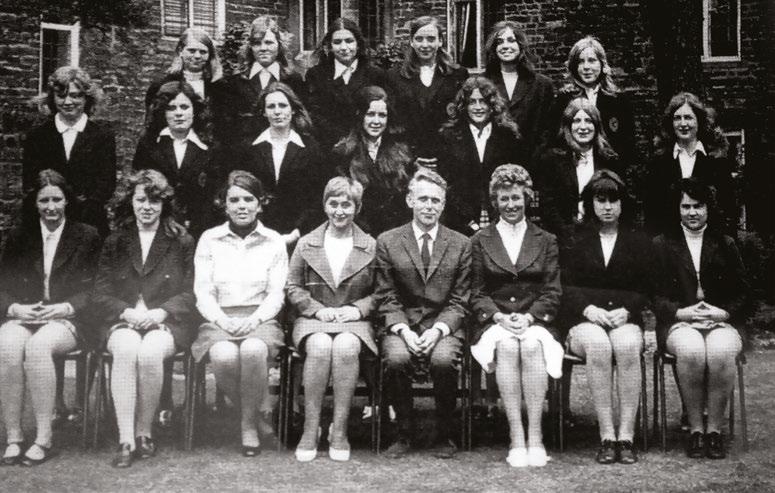
Those first few days were hectic, as the reality set in and old habits needed changing. The boys soon learned to adapt, their language softened, if only ever so slightly, and the more risqué jokes left behind. The first afternoon of sport drew a crowd of rugby boys to the girls’ tennis practice, but the novelty soon wore off. The sixth form boarders found their feet amongst the School House boys, mixing in the Club Room in the evenings. Naturally, some romantic liaisons formed, but the girls didn’t only flock to the 1st XV, as the boys had assumed, forcing a re-appraisal of their values.
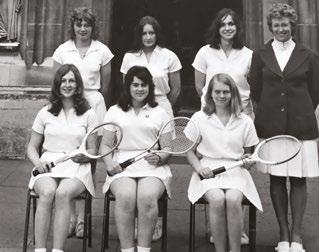
There were, of course, a few teething problems, and there were some staff members who refused to bow to the new reality, insisting on treating the girls with the same severity they had treated the boys, but most were welcoming, and more nervous even than the new girls.
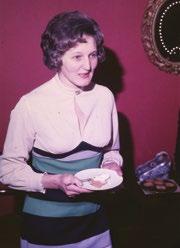
The uniform, as with any school, provoked an inordinate amount of debate, especially as the older girls were permitted to wear home clothes apart from Chapel and ‘formal
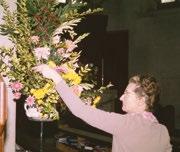 Left: The 17 boarders in College House, 1971
The Girls 1st tennis VI, 1972
Mrs Buchanan (top) and Mary Stevens (bottom)
Left: The 17 boarders in College House, 1971
The Girls 1st tennis VI, 1972
Mrs Buchanan (top) and Mary Stevens (bottom)
18 ARCHIVES | CO-EDUCATION AT OAKHAM SCHOOL
On the afternoon of 5 September 1971, 17 girl boarders arrived at a School that hadn’t known their like in its nearly 400-year history.
In the course of that September afternoon, 17 girls arrived at College House, found their rooms, their beds, made first contact with each other.
Then: time for dinner in the Ashburton Hall. We took courage from each other and, cloudlike, drifted over from College House. In our Buchanan tartan skirts. The hubbub of hundreds of boys eating and talking spilled out of the Hall. The doors opened. Silence fell. We flattened ourselves against the wall wishing ourselves invisible and inched our way around two sides of the square.
Arrived at the self-service unit our hands could get busy as we clutched our trays, gathered our food and headed for the nearest free tables where we could all fit. The hubbub resumed, more muted than before, and not only innumerable boys’ necks craned to assess the newcomers, the masters at top table stared, too.
That was the most terrifying moment. But it passed. Over the next few days we learnt to walk out in smaller ‘girl-clouds’, show confidence even if we didn’t feel it terribly, find our way around the sizeable campus.
Emilie Salvesen (née Ingenhousz) recalling that first day in September 1971
occasions’; a privilege not yet conferred onto the School House boys, who remained suited and booted, and were a tad jealous.
There remained elements of the School which did not integrate immediately; the DofE and Choir remained the preserve of the boys for some years, but overall, the girls integrated fully and quickly. The Oakhamian of Winter 1971 contains high praise for the girls from R.B. Jones, Housemaster of College House, and later The Round House, who commends them for the “shining example to all sixth formers and to the School: The Sorcerer, The Revenger’s Tragedy, Musical Evening, Concerts – even shooting – all owe a debt to them. We are proud of them.”
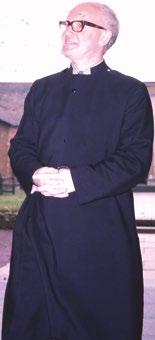
Perhaps the greatest testament to the immediate success of the girls at Oakham is that by September 1972, the number of girls had swelled to 116 – still only about 14% of the population, but more evenly spread across the School.
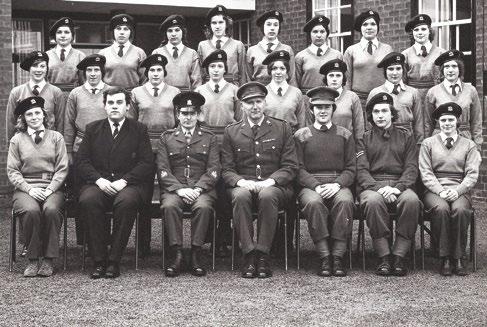
With nearly 100 more girls, including an additional 60 boarders, came the need for much more accommodation than College House could possibly offer. The Round House opened that September, the first purpose-built girls’ House, with 30 bedsits housing 60 girls, as well as 18 remaining in College House with Mr Jones, now HM of Round House. Rev. Terence Treanor took charge of 38 day girls in Talbot House, the first of its kind.
Having kept in close contact with the school for the past five years I had some idea about life at Oakham before I came here. I therefore did not enter the School as a stranger, and settled in quickly.
This term, as I expected, has been a very active one and I have found plenty of time for music. As well as practising, I have participated in The Sorcerer, orchestra, chamber music, and, of course, chapel singing – all very valuable to my musical education. I have also been fortunate in doing one or two other activities, all broadening one’s cultural outlook. I think it is very good for musicians to mix with people from other fields as it eliminates their tendency to be shy and of narrow outlook. In a society such as this, there is no hot-house atmosphere which is, so frequently, present at pioneer music schools. Consequently, musicians can mature as people and this is vital as music reflects the personality of the performer Naturally, I’m biased, but I feel that the introduction of females into a male haven has been very successful. As we live our lives in a mixed society, I can see no good alternative. I feel that it is very necessary for young men and women to grow up together. I feel also that on various topics, both masculine and feminine views are called for. I am sure that co-education will become very popular and that the number of girls in the school will rapidly increase.”
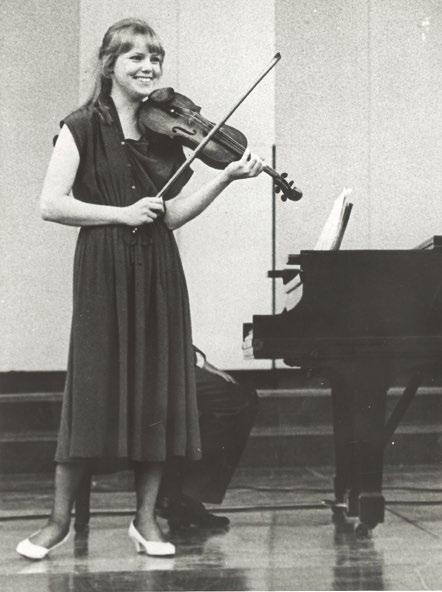 Below: Rev Terence Treanor and his daughter Elizabeth (above)
Below: The first contingent of girls in the CCF, 1973
A letter by Elizabeth Treanor, reflecting on her first term at Oakham, published in the Winter 1971 Oakhamian:
Below: Rev Terence Treanor and his daughter Elizabeth (above)
Below: The first contingent of girls in the CCF, 1973
A letter by Elizabeth Treanor, reflecting on her first term at Oakham, published in the Winter 1971 Oakhamian:
Fully Co-Educational
With the success of “this co-education lark” as one Tutor rather ungracefully put it, came change, and lots of it. The School was, in Buchanan’s own estimation, ‘chasing its own tail’, in this case, victim of its own success in integrating and enticing girls to the School.
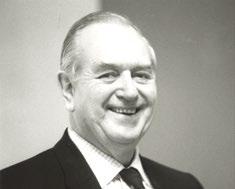
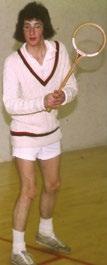
The Changing Campus
Anew Sports Hall was opened in 1972, replacing the old gym, which since 1970 had also been serving as the Pavilion. This thoroughly modernised the sporting facilities that Oakham had to offer, with a gymnasium, squash courts, and an indoor swimming pool that replaced the outdoor pool at the bottom of the campus, which had naturally been at the constant mercy of the English weather.
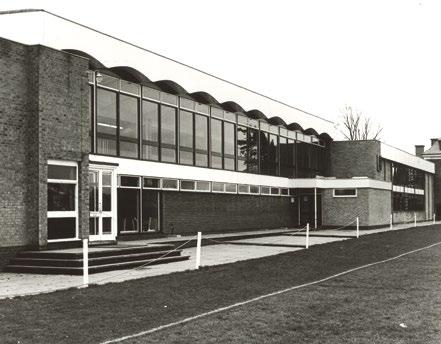
As the numbers of girls shot up, and the total number of pupils in the School with it, housing them all became the decade’s constant battle. Despite the success of the First & Second Development Campaigns, the finances did not allow for the level of expansion that the campus required.
In stepped The Visitor, John Jerwood (’35), whose own faith in the co-education project at Oakham led to the opening, and re-opening, of his own sizeable pockets. The Lower School Campus, which came to be known as ‘Jerwoods’, was expanded with two new buildings next to Peterborough House, to accommodate Peterborough and Lincoln Houses for the boarders, and Sargants and Ancaster for the day pupils.
Many of the Seventh Form girls were at that time billeted around town with Oakham School families, and while many of the girls enjoyed their time in lodgings, a sustainable model it was not.
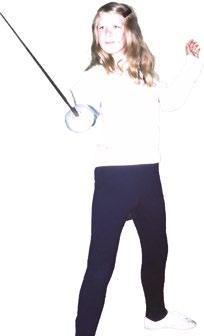
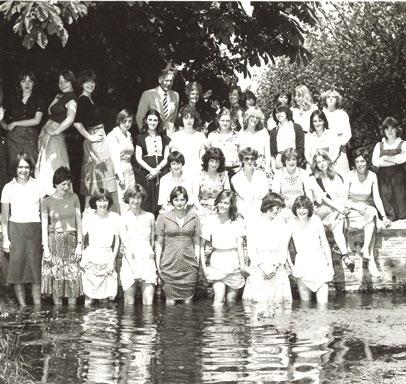
Orchard Close, once the retirement residence of W.L. Sargant, was purchased in 1975, to be converted into a girls’ House, in theory to replicate the boys’ model of School House as a Seventh Form House. However, in its first year, it played host to the Stevens family, 5 plucky girls and an army of builders, and even after its full opening, there was plenty of internal wrangling about which girls ought to be housed there.
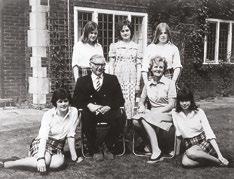
It wasn’t only the girls’ Houses that needed work, and the boys’ accommodation was falling rather behind in its comfort compared to that offered to the girls. Much of the campus was renovated throughout this period, including all the boys’ Houses. New laboratories were built to cater for the growing number of scientists.
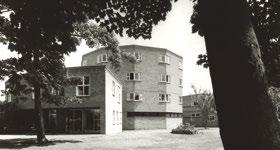 Top: Lincoln House (1986)
Above: Buchanans House informal photograph (1978)
The newly built Sports Hall (1972)
Above left: C.J. Palmer playing squash
Above right: The first five girls boarding in Orchard Close (1975)
Top: Lincoln House (1986)
Above: Buchanans House informal photograph (1978)
The newly built Sports Hall (1972)
Above left: C.J. Palmer playing squash
Above right: The first five girls boarding in Orchard Close (1975)
ARCHIVES | CO-EDUCATION AT OAKHAM SCHOOL
Right: John Jerwood
A Rounded Education
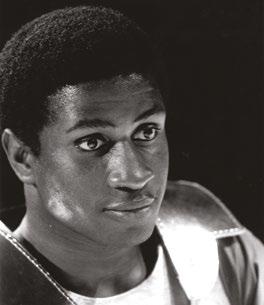
The arrival of the girls accelerated the broadening of the School’s offerings which Buchanan had been working toward since his arrival, both in the classroom and outside it, and the School began to take the shape he envisioned for it.
The CCF deserves a special mention for its endeavours to accommodate both boys and girls. Buchanan had written to the Ministry of Defence to inquire about the possibility of the girls joining the Corps; the joint Cadet Executive were surprised by the request, “up until that time we had not given much thought to the matter”. The request was granted and Oakham, along with four other schools, was selected for a pilot programme.
The Duke of Edinburgh’s Award Scheme soon followed the CCF in integrating, and in 1977, the first girls received their awards, with 4 Silver and 14 Bronze awards; the first 3 Gold awards would soon follow in 1979. The success of the DofE programme also led to the creation of the Oakham School Exploration Society, which went on its first expedition to Spitzbergen in 1979.


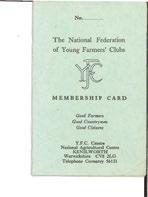
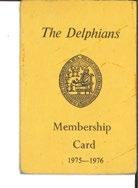
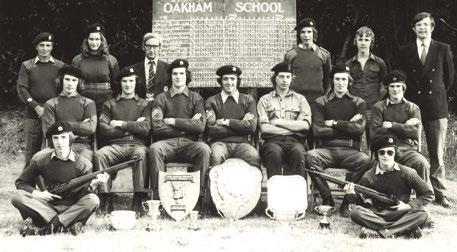
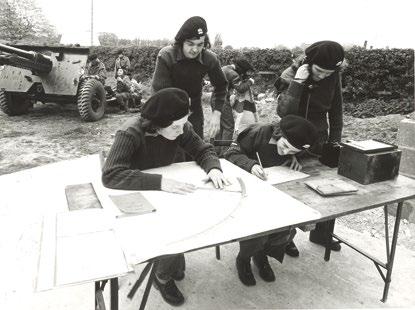
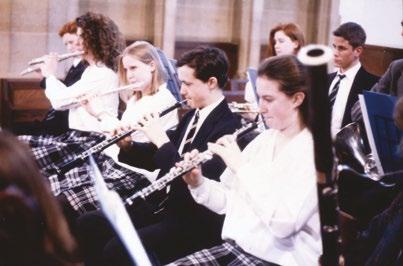
Music and theatre, already in a vastly improved state by 1971, were only enhanced by the arrival of talented female musicians and thespians. On the stage, the girls who had arrived from single-sex schools were just as eager to play female parts as the boys were excited by no longer being required to do so. Between the Shakespeare Centre and the Barraclough Hall, productions of all shapes and sizes were a regular fixture of the School calendar. In music, one orchestra had become three, the CCF band became two concert bands, and the School’s musicians became “excellent ambassadors”, playing dozens of concerts in the School and the local community.
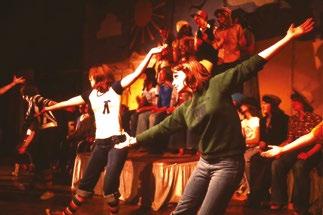
Societies became a central part of the timetable, rather than an evening afterthought, meaning that day pupils could join, and the Red Books of the era testify to a very active social life, with well over a dozen societies meeting regularly, and welcoming public speakers to the School or going off on trips to the theatre or to a concert.
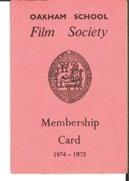 Left: The orchestra (1990s) Right: Society membership cards (1970s)
Kwamé Ryan in Dido & Aeaneas (1989)
Girls going on a D of E expedition (1992)
The musical Joseph (1975-1976)
A CCF camp
Iceland expedition (1979)
The 1976 Shooting team
Left: The orchestra (1990s) Right: Society membership cards (1970s)
Kwamé Ryan in Dido & Aeaneas (1989)
Girls going on a D of E expedition (1992)
The musical Joseph (1975-1976)
A CCF camp
Iceland expedition (1979)
The 1976 Shooting team
Academic success
Academically, the School reaped the full fruits of co-education. Given the demand for girls’ places, the Registrar was able to demand 6 O-levels, far exceeding the requirement for boys to re-enroll into the Sixth Form. There was, for a few years, a disparity between the boys’ and the girls’ marks, although by 1976, the boys had an A-level success rate of 86%, only 2% shy of the girls’ 88%, which Buchanan described as “the culmination of so much for which [he] had striven at Oakham ever since 1958”.
Sporting success
Despite the grumblings of some staff members and Old Oakhamians, who had suggested that going co-educational would condemn the various sporting endeavours, the opposite proved to be true. In 1971, the 1st XV Rugby team beat Uppingham and Oundle for the first time. The decade of success for the XV culminated in 1980, winning 14 of 14 matches, beating Uppingham to cap off the perfect season. Cricket, after an abject 1960s, was rejuvenated in the 70s, including an unbeaten season in 1972.
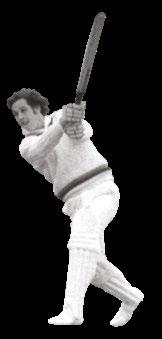
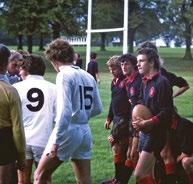
The integration of the CCF also brought the assimilation of the Shooting team. Helen Brooks was the first girl cadet to shoot at Bisley, and later Ginny Measures was one of four Oakham representatives to shoot for England in BSSRA home internationals. The much-improved facilities of the Sports Hall also brought about great successes for swimming and squash, and in 1980, the girls’ squash team won the Sereena Cup, the national schoolgirls’ title.
The post-Buchanan era
In 1977, John Buchanan retired and made way for his successor, Richard Bull. The School which Buchanan passed on to Bull was practically unrecognisable from the small provincial grammar school he inherited in 1958. It was only fitting that the newly converted Orchard Close was renamed Buchanans House in his honour.
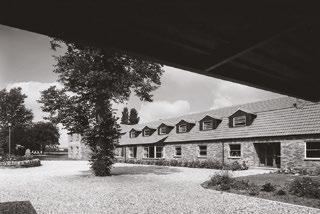
Co-education was cemented at Oakham School under Bull’s leadership, and the School’s rapid expansion continued apace. Rushebrookes House, named after the School’s first Headmaster, was opened in 1980, and brought the number of girls’ Houses equal to the boys for the first time. An extension to Buchanans House followed shortly thereafter. Upon its completion, the decision was taken to match Round House with School House, and Chapel Close became the Seventh Form Campus.
By the time Bull left for Rugby School at the end of 1984, during which time the School celebrated its Quatercentenary, girls accounted for 45% of the populace.

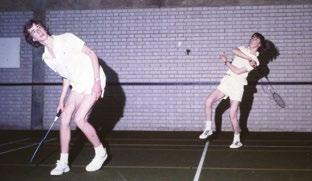
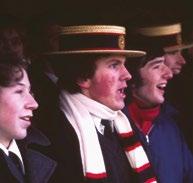
It was his successor, Graham Smallbone, who oversaw the concluding milestones in making Oakham School fully co-educational. 1989 brought about one final momentous shift – Deanscroft was converted into Stevens House, a girls’ Boarding House, while its erstwhile male residents moved across Doncaster Close to the newly built Haywoods House. That same year saw girls account for 50% of the pupils at Oakham for the first time ever. There has been a bit of fluctuation, including in 1991 when girls outnumbered boys, but it has remained a roughly equal split ever since.
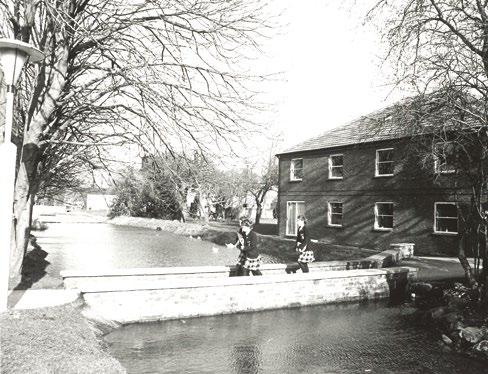
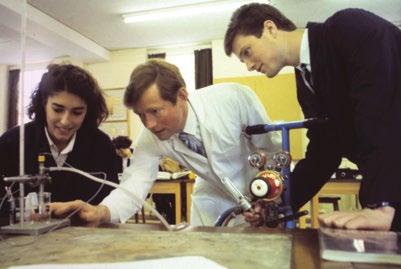
There is no way a piece of this length could do justice to the last 30 years, but it’s fair to say that they have built on the foundations of those early co-education years, with sporting, artistic and academic successes too numerous to mention.
50 years on from that first group of 27 girls, many, if not most, Oakham pupils take the presence of the opposite sex for granted. But it’s worth remembering that some visionary leadership and a few brave young women made it all possible, and shaped Oakham School into what it is today.
22 ARCHIVES | CO-EDUCATION AT OAKHAM SCHOOL
Photographs of sporting events in the 1970s
Rushebrookes (1980)
Buchanans new extension
One of the memories, amongst others, that stood out for me, was wearing a cape! This was part of the uniform over our blazer and as I rode my bike to school, it was a bit like being a superhero, as it flung out in the breeze behind me!
I have some lovely memories of Speech Days in the Sports Hall, looking down from the balcony, the little individual desks with inkwells in a classroom in the Deanscroft area, the muddy hockey pitch, the “Fred” machine that would fire balls out to practise tennis and one day, we were allowed to give lacrosse a go! I remember having an English lesson over in Kilburn Road with Rod Smith and Biology with Richard Davies, also French with John Barber.
As regards the introduction of girls to the school, it never stood out to me at all that there were more boys than girls at that time. It just seemed so normal and I remember looking up to the older pupils in awe in the queue in the dining hall!
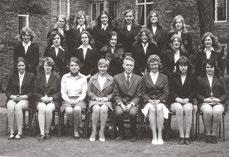
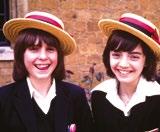
I really do have such happy memories of my time at Oakham and feel so glad to have had the opportunity to go to a wonderful school.
Delia Moutrey (’79)
Extracts from ‘Co-Education Seven Years On’, published in The Oakhamian Spring & Summer Terms, 1978
Old Oakhamians of the pre-co-educational era, and I trust I shall still number them among my friends after they have read this article, say to me with a gleam in their eyes, “Don’t the girls give you a lot of problems?”
“Of course they do,” I reply, “but really no more than you did in the 50s and 60s, only different ones!”
“Are they not lowering the standards of school games? They ask. “Four defeats of Uppingham in six matches on the rugger field, and thirteen Duke of Edinburgh Gold Awards this current year do not suggest to me an effete society”, I answer.
One of the greatest attributes of many Old Oakhamians, which I have always admired, is their intense loyalty to the school. It is too early yet to judge whether the girls will share the same degree of loyalty, but the increasing numbers that we are beginning to see at Old Oakhamian reunions suggest that in time they will.”
Ronnie Henton, Second Master & Director of Studies
Oakham
Update, Winter 1991, issue no. 12
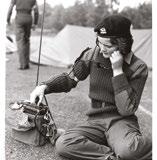


Co-Education Vox Pop – our new 1st formers tell all
• “It’s a challenge”
• “With boys present you will never be bottom of the class because it means there are some unclever people present”
• “Boys nearly always get the blame when things go wrong”
• “It’s dull without the other sex”
• “There are always girls present who have finished their prep and you can copy it”
• “Boys are so vain”
• “Boys are cheeky and rude and make classes more fun”
• “If you are worried about doing something wrong, don’t be, a boy will do it first”
• “If you are upset about something, don’t worry, a boy will make a joke of it and cheer you up”
• “When you have been to the School Shop the girls stop you and ask for sweets”
• “It’s funny to see girls fuss all the time”
• “You tend not to think of the opposite sex as being totally different”
• “As girls are cleverer when young it encourages the boys to catch them up and pass them”
• “Can be embarrassing”
Significant Co-Education Milestones
1970
Oakham School returns to full independence
1972
The Round House opens
1971
The first cohort of girls arrives
1974
Jerwoods Campus opens
1975 Orchard Close purchased and converted into a girls’ House
1977
JDB Retires; Orchard Close becomes Buchanans House
1973
Girls are admitted into the CCF
1984
Oakham School celebrates its Quatercentenary
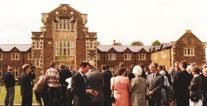
1980
Rushebrookes House opens
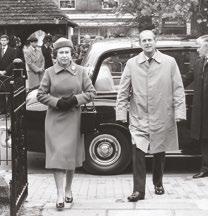
1982
Buchanans extended
1983
Round House becomes a Seventh Form House
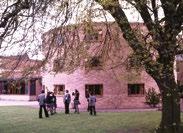
1989
Haywoods & Stevens Houses open, the population is 50/50 boys and girls for the first time
1996
Schanschieffs site opens, creating four Houses for day girls and boys
Late Summer Drinks & 5-Year Reunion
Written by Joe Roberts
This summer offered our first chance to welcome OOs back to campus since the pandemic began. And so, on a lovely August weekend, we held our first in-person alumni events since Christmas Drinks 2019.
We began with the summer drinks reception, the ‘Late Summer Drinks’ (aptly named in more ways than one), in the BAF Smith Pavilion on Friday 13 August.
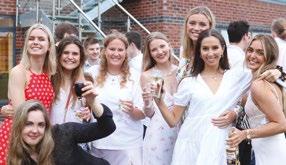
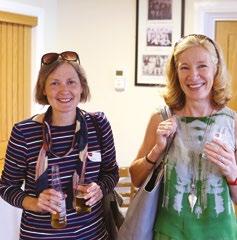
We welcomed back OOs and Honorary OOs of all ages to have a drink and some canapés, and a chance to reconnect with friends and old teachers, whom many hadn’t seen for some time.
The following evening, we held our first reunion, as the Class of 2016 descended upon the campus. With over 80 OOs from that cohort arriving at BAFS on Saturday 14 August, they were clearly eager to see each other and swap tales of their time at Oakham and beyond.

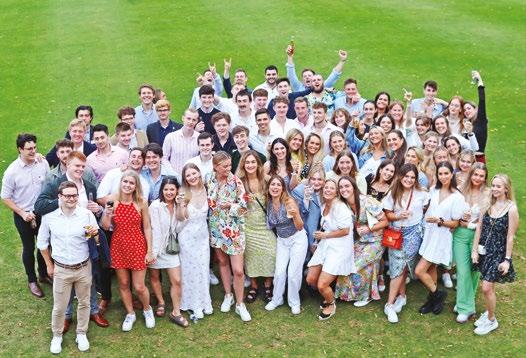
It was a lively affair, and the celebrations continued late into the night, with the party moving into town once we shepherded them out of BAFS, well after the scheduled closing time.
It was a real pleasure to see so many OOs back on their campus and see that the bonds built here at Oakham endure beyond schooldays of yore.
Old Oakhamian Lodge No 8033
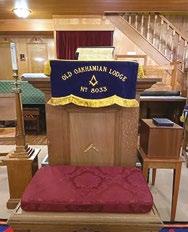 Written by Richard Wright (’75)
Written by Richard Wright (’75)
The Old Oakhamian Masonic Lodge is probably one of the most regular and widely supported sections running under the Old Oakhamian banner. Since its consecration in 1965, the Lodge has been fortunate to have had the support from Oakham’s Headmasters, who have enabled us to hold meetings at the School. We meet four times a year, on the second Saturday in March, May, October and December, in the Old Hall in School House. After several virtual meetings, it was with great pleasure that we were able to hold our first in-person meeting at the end of October 2021.
The Lodge has become a focal point for so many Old Boys, who have kept up their association with the School, together with the ideals furthered by Freemasonry such as integrity, respect, friendship and charity. Many travel a long distance, and even from abroad, to attend our meetings.
The membership covers a wide range of Old Boys, from more recent leavers to a few who can remember life at Oakham in the post war years. We are able to conjoin all our experiences and enjoy the tales of bygone years in a friendly and relaxed atmosphere.
The Lodge is highly rated within the Masonic Province of Leicestershire and Rutland and attracts many visitors, who are always made welcome.
We have a commendable charity record and support a number of charities local to Oakham, including The Foundation.
• GENERAL INFORMATION ON FREEMASONRY CAN BE FOUND BY VISITING:

• INFORMATION ON FREEMASONRY FOR WOMEN CAN BE FOUND AT:
The Order of Women Freemasons | Womens Freemasonry | Nationwide owf.org.uk
Or HFAF | Freemasonry for Women hfaf.org
• Feel free to contact us if you are an existing Freemason or have an interest in joining the Lodge. You will be made most welcome.
• Contact details and more information about the Old Oakhamian Lodge can be found on the website: oldoakhamianlodge.org.uk
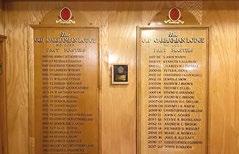
24 REUNIONS
50 Years of Co-Education Afternoon Tea
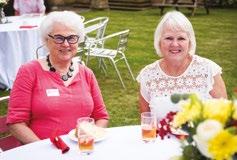
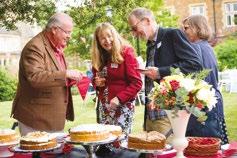

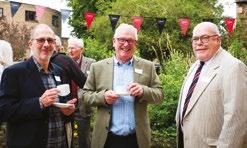
Fifty years on from that fateful day in September 1971, when 27 brave girls broke the nearly four centuries’ old male-only tradition and moved into College House, we kicked off our 50th Anniversary celebrations with a blast from the past. While the teaching staff were stuck in their INSET meetings for the coming Winter Term, 60 OOs from the first decade of co-education returned to commemorate those early years.
On Friday 3 September, we hosted a Chapel Service followed by Afternoon Tea on the Round House Lawn, and of course a tour of the School for those who wanted to see how it had all changed since their time here – including a peek in College House, which looks a bit different inside than it did in September 1971.
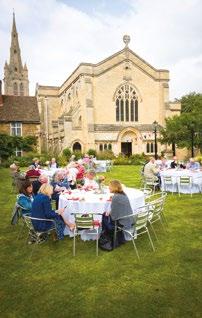
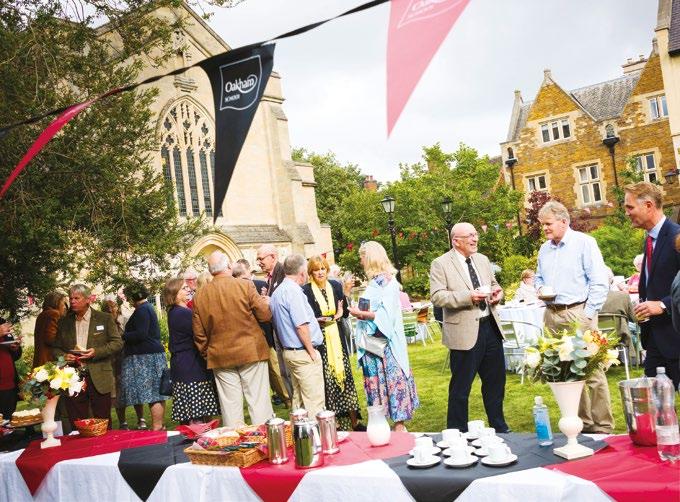
During the chapel service, Headmaster Henry Price spoke about the School’s history whilst OO Jonathan Stevens, who left Oakham in 1979, shared his thoughts and stories of when the School first became co-educational.
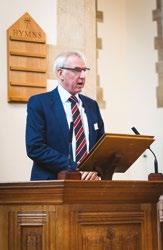
In his speech, Jonathan shared some of his father, Mike’s memories, as well as his own: “It was
Written by Joe Roberts
certainly a very memorable year in 1971 when Oakham became co-educational and for all of us, it was very life changing.”
“Whilst it was a very different time, with shyness and cultural differences to overcome, this awkwardness certainly didn’t last long, and everyone adjusted very quickly. We were all very proud to be part of a forward-thinking School which always ensured everyone had a sense of belonging.”
Although bad weather had threatened earlier in the day, the rain dutifully disappeared in time for a lovely afternoon reminiscing and enjoying some wonderful cakes and conversations.
Visit our 50 Years of Co-education webpage for more news and memories, including a new speaker series ‘Oakham Talks’, and a podcast series on co-education.
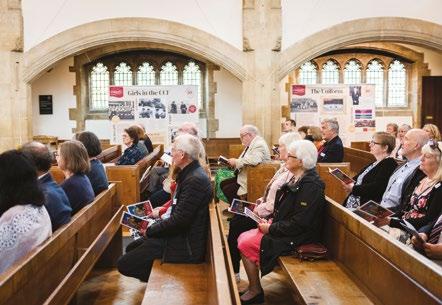
Scan this QR code to find out more.

25
It was certainly a very memorable year in 1971 when Oakham became co-educational.
Jonathan Stevens (‘79)
NICK PRIESTNALL (’69) President of the Archdeacon Johnson Legacy Society
Nick Priestnall (’69) is the inaugural President of the Archdeacon Johnson Legacy Society, having very kindly agreed to lend his experience as a fundraiser to the Foundation’s Legacy drive. Nick is the former Director of Development at Berkhamsted Collegiate School and Mill Hill School, having set up their fundraising operations to great success before semi-retiring in 2019. He now works as a fundraising consultant and volunteers as Chairman of the Board of Trustees for the Alford House Youth Club.
Written by Joe Roberts
Nick came to Oakham School in the Winter Term of 1967 for his A-levels, joining Chapmans House, having never had any intention of going to boarding school. His father, a parish priest, was swapping his parish outside Derby for Rockingham. In order not to disrupt his Sixth Form years, Nick came to Oakham in advance of their move, with the intention of boarding for only one term before becoming a day boy.

“My first term at Oakham was not a very happy one. That first term was all about rugby – but I wasn’t allowed to play rugby as I’d had a head injury.” And he didn’t quite fit in with his new classmates, having kept his “short-clipped Mod haircut and sideburns”, popular amongst his old friends but not so at Oakham.
But towards the end of the first term, Nick had begun to settle, having received some good academic reports, and he convinced his parents to let him continue boarding in Chapmans (with some fee assistance from a great uncle). By the second term, he was playing Fives, having done so at his previous school, and joined the indoor cricket net sessions, where it became clear he was destined for the 1st XI.
In his second year, Nick joined the potential Oxbridge candidates in College House under the tutelage of Ben Jones, Teacher of History and Housemaster of College House, and later the first Housemaster of Round House. That final year was a formative one.
“Ben Jones was very inspirational as a teacher; in addition to his role as a Teacher of History, he believed his job in College House was to make it a stimulating and interesting place. Every half-term, he would bring a friend over he knew from university or elsewhere. We would have to dress formally for dinner, have a glass of sherry, a glass of wine and a glass of port, and conduct a proper conversation with this man. Ben Jones took the view that one of his jobs was to teach young gentlemen how to dine in public, which has held me in enormously good stead, particularly at innumerable alumni and formal dinners in the years since.”
Nick went on to read History at UCL, before becoming a teacher. “The only thing I knew when I left Oakham was that I didn’t want to teach. So, of course, the first thing I did after university was teach.”
FOUNDATION INTERVIEW 26
Below: 1584 Society President Peter Lawson (’60)
at the Foundation Societies Lunch in September 2021
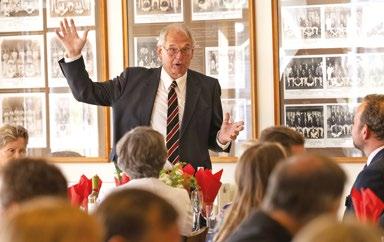

This was inspired in part by a desire to travel, and teaching offered Nick the chance to do so. His first posting was in the Solomon Islands, then the British Solomon Islands Protectorate, where he taught History for two and a half years, fell in love with teaching and made lifelong friends. Nick also taught in New Zealand and Fiji on his meandering return home to England, where he went to Cambridge to do his teacher training to try to get a cricket Blue. Nick got his PGCE but not his Blue!
Three years at Cranleigh School in Surrey followed, where he was a Resident Tutor, 2nd XV rugby coach and assistant coach with the 1st XI Cricket team. After a disappointment in being passed up to run the cricket programme following the coach’s departure, he decided to find pastures new and moved to London. Nick moved into the drinks trade, followed thereafter by a move into Sports Marketing, where he built a successful career for two decades, before being recruited as Development Director of Berkhamsted Collegiate School.

“I often thought I would go back to working in a school, as I had enjoyed it so much. Development provided the opportunity to combine my marketing and communications expertise with my knowledge of schools. In those days, in the UK there were fewer than 100 schools with a Development Office and many school alumni were sceptical about fundraising.”
Nick’s success at Berkhamsted led to his appointment at Mill Hill School to set up their Development Office, where he oversaw a campaign that raised over £10 million during his
tenure. At both schools there was some initial resistance and plenty of doubt, particularly amongst the alumni, but they were won over eventually. “Some at the Old Millhillians Club feared that by having me at their dinners, they wouldn’t be safe to go without being asked for money, and I worked very hard at both places to allay those fears. Ten years later, I was being asked to speak at all the dinners and tell people what we were doing fundraising-wise, because they had begun to accept it as an integral part.”
After leaving Mill Hill, Nick has continued to work as a consultant for schools and other non-profit organisations looking for fundraising help. The last few years have certainly not been the easiest time to fundraise for schools, as people’s philanthropic endeavours have naturally gone towards helping pandemicrelated causes, such as the NHS. But he believes that’s where the value in a legacy drive and legacy society lies. “Most legacy decisions are made from the heart, regardless of current finances, but rather what someone might like to do in the future Way, way in the future we hope!”
And Nick’s own decision to leave a legacy certainly stems from a love of his old school. “There are lots of people who benefited hugely from an Oakham education. The School was founded by a gift, and there are many people who have donated in the past.
I’m very keen to ensure the School flourishes, and that as many people as possible can access it through bursaries in the future. That’s why I’m committing a legacy; come join me.”
To find out more about the Legacy Society, contact Nick: np@oakham.rutland.sch.uk Or contact Development Manager Asha Hickin: 01572 758699 ah@oakham.rutland.sch.uk
27
Below: Nick speaking at the Foundation Societies Lunch in September 2021
Left: Nick (front row, far right) with the cricket 1st XI in 1969
speaking
FINDING THE RIGHT FORMULA
We last spoke to Ellie Slater (’13) when she was an undergraduate doing a placement year with the Mercedes AMG Petronas F1 Team as a Tyre Engineer. Five years after that initial interview, Rachel Fairweather caught up with Ellie to find out about her life since finishing university.
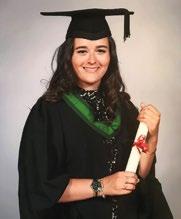

llie graduated from the University of Leeds in 2018 after finishing her Honours Class 1 in Meng Automotive Engineering (Industrial) and got a job working with Red Bull Advanced Technologies as a Simulation and Modelling Engineer. Part of a 15-strong team, Ellie’s primary focus was on developing ‘Valkyrie’, a new road car using F1 technology produced in collaboration with Aston Martin. “This provided broad, generic work focusing on different aspects from concept simulation and analysing results to hydraulics and control systems.”

After being made redundant due to the Covid-19 pandemic, Ellie spent six months working with her school friend Jess Armitage (’13) milking cows and “absolutely loved it”; so much so that Ellie now helps out most weekends and has her own favourite cows amongst the herd.

November 2020 saw Ellie return to the world of F1 and she now
works for Alpine F1 (formerly known as Renault Formula 1) as a Software Engineer, primarily using the HIL (Hardware-in-the-loop simulation) rig to ensure their cars are ready to race.
Based in Oxfordshire and back working within a Formula 1 team, Ellie is once again enjoying the fastpaced world of race car engineering. “You sometimes have to work long hours to meet deadlines, but I love working within that sort of time pressure. Oakham with its long school days prepared me well for this side of the job.”
Naming Head of Physics, Dr John Chilton, as one of the main reasons why she chose to study Engineering at university – “Dr Chilton was always very supportive” – Ellie credits another more unusual subject that she studied at Oakham School as having helped her enormously with her career thus far. “Fine Art was the best thing I did. I gained my subject knowledge [in order to study Engineering] from Maths and Physics, but there are so
Left: Milking cows for school friend Jess Armitage (’13)
Below: First day at Alpine F1
many transferable skills I developed from studying Art that helped me a lot at university and now in my job: communication, presentation, and research skills, paying close attention to small details.”

Ellie loved Art so much that her initial career plans tended in this direction – in fact she still takes on art commissions in her free time. However, a variety of work experience placements that Ellie did whilst at School helped to guide her in the direction of Engineering. After time spent at an interior design company and then an architect’s firm, a chance suggestion from Ellie’s father that she try a motorsport placement saw her spend a week in the autumn of Form 7 with the European F3 Team WestTec in Corby. “I loved it so much that I didn’t want to leave. I spent a test day in Silverstone and fell in love. It was a happy accident that worked.”

Reflecting on her ambition whilst on her undergraduate placement to be ‘working trackside, preferably as a tyre or race engineer’, Ellie says that although this is something she might consider in the future, it’s no longer the summit of her ambitions: “I would still love to gain the experience of race engineering and working trackside on the tyres, but I’m not sure this is something I would want to do in the long term. There are 23 F1 races throughout the year, which means 23 weeks of the year you are away from home and whilst travelling all over the world may seem glamorous, it’s often just the airport, hotel and race track that you see.” Ellie’s future may see her combining the experience she gained working with Jess’s dairy herd with her engineering expertise: “My perfect life would be engineering in the winter and milking the cows in the summer.”
ELLIE’S ADVICE ON ENGINEERING AS A CAREER
Get as much work experience as possible.
Any work experience is good experience. It doesn’t matter what it is – through it you will find out what you want to do. For race car engineering, for example, you could consider all the formulas or volunteer as a race marshal. The transferable skills that work experience teaches you and the skills you gain from being in a workplace atmosphere are invaluable. It’s just as important to discover what you don’t enjoy doing, as well as what you like.
Learn to code.

It’s really important to have a basic understanding of coding and it will come up at university. There are lots of different programs you can teach yourself: MATLAB, Python and C# are a great place to start.
Develop communication, presentation and research skills. These generic transferable skills are just as important as having the right subject knowledge.
Consider an apprenticeship. For those interested in a hands-on career as a technician or mechanic, a lot of F1 teams offer very good apprenticeships. This could be a route for those who don’t necessarily think that university is for them, but are still interested in racing too.

29
There are so many transferable skills I developed from studying Art that helped me a lot at university and now in my job.
Right: Two of Ellie’s art commissions
Below: Ellie with the Red Bull Advanced Technologies Team
20 YEARS OF THE OAKHAM SCHOOL FOUNDATION
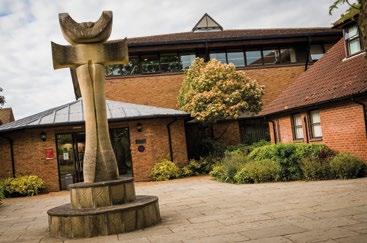
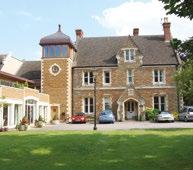
September 2020 marked 20 years since the Oakham School Foundation opened its doors. Its mission, to support Oakham School in its strategic objectives through charitable fundraising. There was already a storied history of charitable giving at Oakham, and the Foundation’s goal was to build on that legacy. Written by
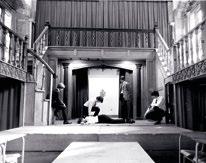
Fundraising pre-2000
John Buchanan launched an appeal in 1963, the first in the School’s history to use a professional fundraising company, to great success. It led to the Haywood Building (now the Ashburton Building), the Design Centre, conversion of Peterborough House into a boys’ House, and the creation of the Shakespeare Centre in the Old School.
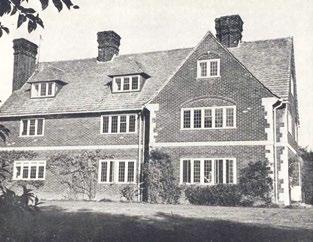
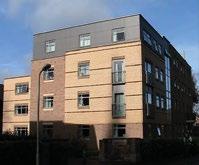
The Foundation
In 2000, the decision was made to create a dedicated fundraising office, under the direction of Martin Minshall, who was the Director of Admissions at that time, to fund projects which would enhance the lives of everyone in the Oakham School community, thereby continuing and consolidating that legacy of charitable giving. In our 20 years, we have funded five major capital campaigns, all of which have had a hugely positive impact on School life.
1Our first project, the Wilson Pavilion and Pitches, which were opened in 2005, provided much needed space for rugby, football and cricket, and have featured some of Oakham’s greatest sportspeople. The Chapel restoration followed in 2007, thanks, in large part, to the generosity of BAF Smith.
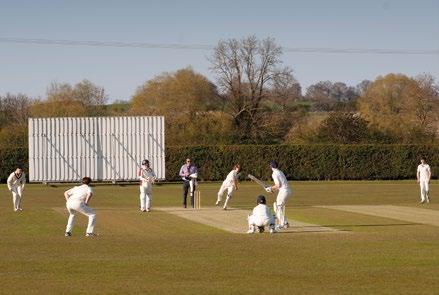 Joe Roberts
Joe Roberts
Later appeals led to the purchase of Orchard Close (later Buchanans), an allweather pitch, and in the Quatercentenary Appeal, the building of the Queen Elizabeth Theatre and Music School, opened by Her Majesty herself in 1984. The Oakham 93 Appeal led to the construction of the Smallbone Library.
20 YEARS OF THE OAKHAM SCHOOL FOUNDATION
30
3The Mehra Faculty of Science, which houses the Wilson Auditorium, opened in 2014. Both have been integral to providing wonderful opportunities for learning and inspiration. In 2019 alone, we were visited by esteemed author and screenwriter, Frank Cottrell-Boyce, and Nobel Laureate and President of the Royal Society, Sir Venki Ramakrishnan.
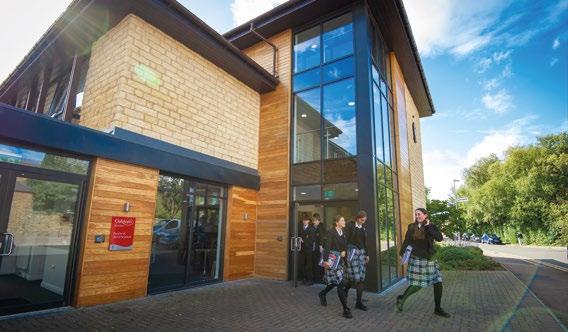
5The last major capital campaign was the Faculty of Social Sciences, opening in 2017 and providing excellent facilities for an evergrowing faculty.
2The Jerwood School of Design (completed in 2008) was next on the Foundation’s agenda, a multi-million-pound, purpose-built facility with cutting edge equipment. In addition to inspiring countless pupils for over a decade, it came into its own in the pandemic, as the DT team made thousands of face shields for frontline workers.
42014 also saw the completion of the BAF Smith Pavilion, opened by Mike Gatting, and has been the home of the cricket and rugby teams, as well as a brilliant hosting space for events of all shapes and sizes.
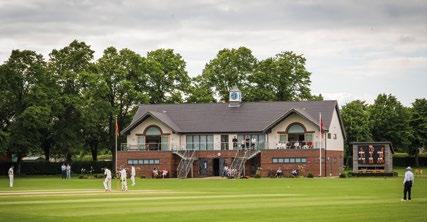
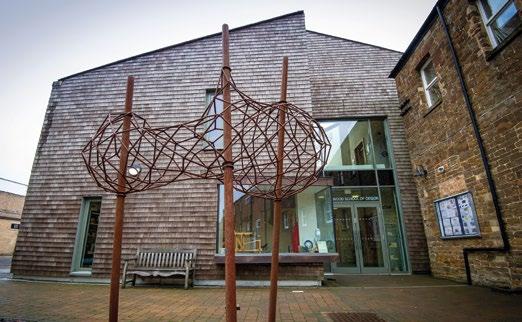
Fundraising for the Future
The focus of the Foundation over the last few years has been the provision of life-changing bursaries, working in partnership with the Royal SpringBoard Children’s Foundation. This is very much in keeping with the founding ethos of Oakham School, and it has been the provision of an excellent education to all-deserving scholars which has been the constant over the last 400 + years, since Archdeacon Johnson opened his free school to 16 young boys eager to learn Greek, Hebrew and Latin in the centre of Oakham.
It is with that in mind that the School and its Foundation’s stated mission is to be able to accommodate 16 full bursary pupils in the next five years, in keeping with its founding principles. Looking back not just on 20 years, but a lifetime of fundraising, it’s clear to see how much the School owes to the generosity of its parents, OOs and supporters. The School as it stands today is practically unrecognisable from when it stood as a single building just over a century ago.

31
FINE FORM
Realf Heygate (’12) is an artist living and working in London. His work was recently featured in a group show at the Saatchi Gallery called ‘In Bloom’. Joe Roberts sat down with Realf over Zoom to chat about his work and his career since leaving Oakham.

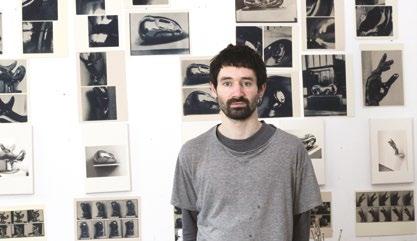
Ithink it’s the first year that the Saatchi Gallery have done this – a show through most of the gallery to coincide with the Chelsea Flower Show. The Royal Horticultural Society run an annual prize that presents botanical drawings, judged by both their scientific and artistic merits. Separate to the prize was a selection of contemporary artists whose work involves botanical forms on a much broader visual spectrum. It’s not exclusively what my work depicts, but I have included these types of forms in a few of my paintings previously. It was a great show, with 10 contemporary artists exploring a diverse range of approaches to botanical imagery.
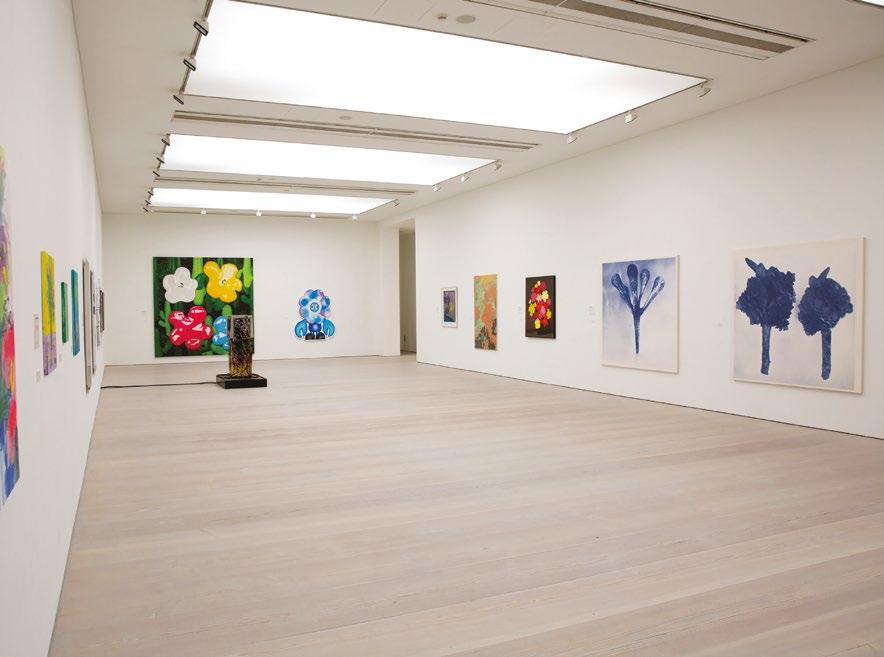
ALUMNI INTERVIEW 32
This was definitely a step-up, in terms of exhibiting in an institution. So far, I have mostly exhibited in smaller spaces. I’ve had solo shows which were, of course, significant to me. But this show was particularly special, as when I was at Oakham we were taken to the Saatchi a few times. To now be one of the artists exhibiting there really meant a lot to me.
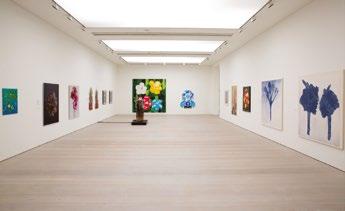
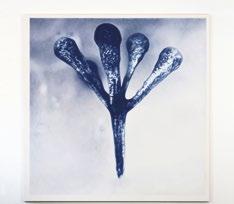
I’ve taken quite a traditional route [to becoming a professional artist]. I finished at Oakham in 2012, then moved to London in September 2012, to do an Art Foundation course at Camberwell College of Art, which is part of the University of the Arts London. I went from there to Central Saint Martins to do a BA in Fine Art. Afterwards, I stayed in London and was fortunate enough to be awarded a place on the ACME Associate Studio Programme, which gave me two years in a subsidised studio, with additional support from tutors and visiting artists. It was the perfect stepping stone between being in an educational institution and working independently as an artist. That ended two years ago and since then, I’ve been practising in my own shared studio.
Essentially, my paintings are of printed matter. They depict pages from catalogues and art books. If I’ve got an exhibition coming up, I’ll normally go to second-hand book shops or trawl through the internet and source a lot of old art catalogues, then flick through them. There’ll be some pages in those books that I think could look great as paintings, and so I’ll go about forming a hand-painted reproduction of them. The final paintings might appear photo-real, but are littered with material idiosyncrasies at closer inspection. It’s a very slow, meticulous process, but it’s the slowness of the process that I really enjoy.
[Covid] was definitely a challenge. Not having exhibitions going on, both in terms of showing my own work, but also in going to see other people’s work. I often find that I’ll get most of my ideas when I’m out and about seeing other people’s shows. To not have that stimulation was tough. But, on the other side, a nice thing about working as an artist is there’s always something to do. I was fortunate enough that I could still safely go to my studio, so I kept painting every day. It provided simple tasks to be doing through that whole period - it got me through it; to be able to work creatively through a difficult period like that was something that I felt very fortunate to have.
I hope the next step will be exhibiting internationally. The vast majority of my shows have been in London so far. There’s such a wide array of spaces here that I’ll never get tired of doing that, but I’d like to get to a point where I could be travelling abroad to show my work.
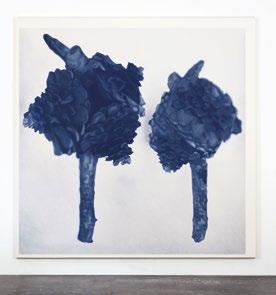
The way I make my art is a process that I’ve developed since I left School and that I’ve been fine tuning nearly 10 years now. I think it’s a process that might on the whole remain fairly similar, but I will continue to fine-tune. I’ve always really liked witnessing artists who for 50 years or so have essentially honed one subject and one technique and explored it to the fullest. I think where slowness is such an integral part of my process, I’m trying to resist the urge to rush on to another subject and rather just let it form much more organically over a long period of time.
Oakham was where I formed an interest in painting as a medium. We were given guidance on how to use certain materials, oil paint for example, whilst having enough freedom to apply it in our own individual way. I found this spurred me on in terms of painting. I remember Mrs Nelson, who was my art teacher, would go through a lot of the art books they had in the library and put post-it notes on certain pages and leave them out for me to flick through with the potential to take that into my own work. That’s something that has remained in my practice; it’s always the start of my process today.
I wanted to be an artist from a very young age. When I got to Oakham, I tried to get involved with as wide a range of activities as possible. I did a lot of music and I tried my best to get good grades across the board. That’s the great thing about Oakham, there’s such a wide range of things you can explore. However, at the back of my mind, I knew I always wanted to pursue Art. Whether it was going to be feasible career choice, I wasn’t too sure! But as I got further into it, I really started to see that ‘No, actually, this is something that I can pursue’. It’s great to be sitting here, almost 10 years since I left School with that having manifested.
Through School, I had ’cello and piano lessons and played in the orchestras. That’s something I’ve been really reconnecting with recently. The lockdowns allowed me a bit more time to focus on music. I think as a teenager who was so busy doing a wide spectrum of things at Oakham, I didn’t realise quite how much the music meant to me at the time. I now feel so grateful for the musical skills I acquired as they allow me another way to work creatively outside of the Fine Arts.
’Cello is what I write most of my melodies on. I play the piano and acoustic guitar as well. My music sounds quite soundtrack-esque, with a wide range of influences spanning modern classical, ambient and folk elements.
I always thought the process of making music was quite separate from my Fine Art process. But actually the way I might make a piece of music is very similar to how I make a painting. Essentially, a piece is gradually formed from multiple layers. In my painting it will be many layers of thin oil, which are replaced with instrumentation in the music. Painting also allows me to listen to a huge amount of music, so I’m seeing a lot of parallels between the two.
Sharing my work is always the exciting part for me. If I do get nervous, it’s always at the point at which I start painting. Even if I know what the image might look like when it’s finished, there’s a still a very large element of the unknown until you’ve gone through the whole process. Once I finish the painting, exhibiting is the point at which the work really manifests. The painting process can be quite lonely, in terms of the intense concentration that’s required. To be able to step out of that and share it, and the conversation that comes out of that - that’s what I enjoy most.
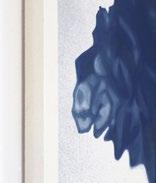
33
1584 SOCIETY
LIFELONG CONNECTION
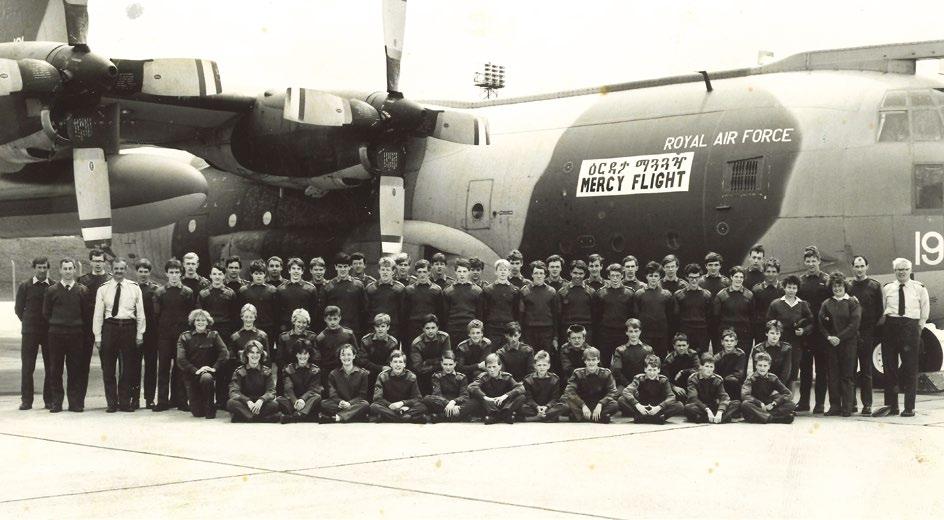
Asha Hickin talks to former pupil, parent and founding member of the 1584 Society, Stephanie Burlison (née Whiteley) (’88) about her unique connection with Oakham School.
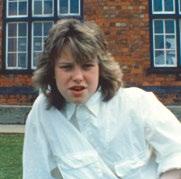
My parents really wanted me to experience a co-educational school that was more diverse than the small prep school I previously attended. They were particularly keen on Oakham, because they felt the facilities were exceptional and were inspired by the overall feel of the School. We viewed other schools, however, this was our favourite, so I came here in 1981 as a day pupil.
I always loved Art and Music at Oakham, but really hated Games, which is quite ironic given that both my daughters are such keen hockey players! We used to have to play on grass pitches at Doncaster Close and in the winter, there was ice in the puddles it was so cold. We didn’t have the kit that children have now: we wore an Airtex shirt with a cricket jumper and the wind would blow right through!
We were served tea in ‘Trough’ daily (the Ashburton Hall, which is where the Merton Building is now). We would try our luck and attempt to go around twice – in the hope that kitchen staff wouldn’t notice! We lined up for our packet of biscuits; the first ones to go would be the Bourbons, followed by the Custard Creams and then right at the end, there would just be the Digestives left. We would hang back waiting for the staff to open another box, however, this wouldn’t happen until the last Digestives had gone! Another food memory I have is queuing for jam and cream doughnuts at Strickland’s Bakery; the line of pupils would sometimes stretch almost all the way back to the Home Economics Block (now the Merton Building) where I remember making Polish Cake with Mrs Mullinger.
FOUNDATION INTERVIEW
34
Sitting on Doncaster Close outside Wharflands
RAF Lyneham Summer Camp 1985. Stephanie is in the second row on the far right, kneeling. Captain Rod Smith is on the far left of the picture
I developed a real passion for aviation whilst I was at Oakham. I joined the RAF section of the CCF and every Wednesday afternoon we took flying lessons at RAF Newton. We flew Chipmunks, a small two-seater aircraft. Captain Rod Smith was in charge and he was ‘an absolute legend’, loved and respected by all. A highlight for me was when I was chosen to undertake the flypast on annual inspection day in 1984; this was particularly special as it was the quatercentenary year of the School. I was the first girl to have undertaken the flypast in the history of the School, and this didn’t go down very well with the boys! I’m sure it was participating in CCF at Oakham where I caught the flying bug that inspired me to go into the aviation industry.
I went solo in a glider before I was old enough to drive a car. I learned to fly a venture power glider in 1986 at RAF Lintonon-Ouse in Yorkshire. This is where I got my wings and flew solo. I fondly remember the annual summer camps – most memorably in 1985 when we camped at RAF Lyneham in Wiltshire, from where the aid donated from the Live Aid appeal was flown out to Ethiopia. We were camping next to the runway that summer and we really didn’t get very much sleep, because the planes were literally taking off every two hours! In 1987 I attended three camps: in July a cadet leadership course at Frimley Park in Surrey; a summer camp at RAF Rudloe Manor; and an RAF skiing camp to Aviemore in Scotland that winter. The skills and experiences from these camps really stood me in good stead for life after Oakham.
I love the fact that my daughters and I have shared similar experiences at Oakham School: from Service Weekends to Chapel services. I remember camping during a Service Weekend where we slept under basha tents, without sleeping bags and ate worms; it was all about survival techniques. Emily is now within the Army section of the CCF, and Sacha achieved her Gold DofE in sailing last summer whilst in Form 7. These days I understand that the Service Weekends are not so ruthless! I was confirmed in the School Chapel, as were both of my daughters. Rev Treanor prepared me for confirmation in 1983 and Sacha and Emily were confirmed together in 2020, it is lovely that we all have this connection to the School.
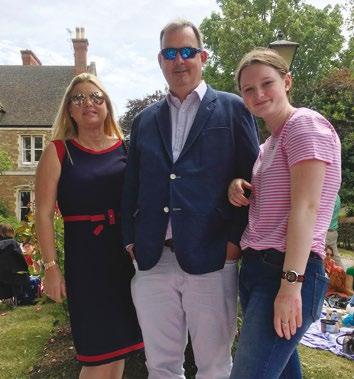
I think Oakham is a very inclusive school. I was never particularly academic, yet I always felt that there was something for me here, whether it was through Music, Art or the CCF. I had the opportunity to try so many different things, I even discovered that I enjoyed jewellery making whilst at Oakham. Equally, I think, if you have a child who’s very academic, or for example, very sporty, they will thrive here too. My daughter Sacha also loved Art and since leaving Oakham last summer has gone on to study a BA (Hons) degree in Textiles and Embroidery at UAL, Chelsea College of Arts. Sacha also continues to play hockey and now plays for the UAL Hockey Team, training at the Olympic Park.
Sacha and Emily started at Oakham having attended a Boarding Taster Weekend. Sacha came as an overseas boarder as we lived in Dubai at the time. She started the term after she turned 10 and was followed by her sister Emily three years later. Both girls settled in very quickly, under the fabulous care of their Housemistress Helen Foster. As an Old Oakhamian, revisiting Oakham as a parent felt like coming home; the School felt exactly the same as when I was a pupil and there were so many familiar faces, including Val and Joy Harvey, and Jon Wills, who all also taught me. Sacha and Emily’s teachers, Tutors, Housemistresses and Matrons have done an amazing job of supporting the girls through their Oakham journey.
The way that Oakham School structured distance learning during the lockdown was invaluable. It was really rather nice to hear Mrs Drummond’s voice coming out of the computer at morning Roll Call. Having a set timetable so that the girls were able to study and complete their lessons gave us a sense of normality. The timetabled off-screen days where they had to go and do some volunteering were also important. Emily helped our neighbour on her farm, cutting back brambles and helping her with the animals. The girls also had interhouse competitions every week, just to keep them as connected as possible with their House ‘families’. These days were a great way to reinforce kindness and support for the community. Rushebrookes Form 6 even managed to fit in a virtual trip to Paris!
I think that the best thing that you can give a child is a good education. I feel that being educated at Oakham has been a huge privilege. Oakham holds a very special place in my heart; it always has and always will. It has definitely shaped my life and it’s something that I’ve been fortunate enough to be able to do for my children as well. I’m very aware that there are a lot of children who aren’t fortunate enough to be able to attend a school like Oakham.
I joined the 1584 Society in 2018 and was one of the very first members. What I like about the 1584 Society is that it gives a child the opportunity they would not have had to come to the School and benefit from all Oakham has to offer. Being a member of the 1584 Society is my way of helping somebody to have the chance to benefit from a good education.
For more information about the 1584 Society, please contact Asha Hickin, Development Manager at ah@oakham.rutland.sch.uk
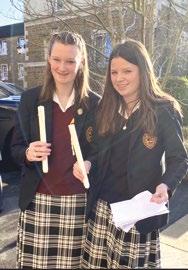
Being a member of the 1584 Society is my way of helping somebody to have the chance to benefit from a good education.
35
Oakham holds a very special place in my heart; it always has and always will.
Sacha and Emily at their Confirmation on 18 January 2020
Stephanie with her husband David and daughter Sacha outside Jerwoods at Lower School Prize Giving
The Lions, the Tigers and the Year Rugby Lost
Written by Emily Howett
With all contact sports being halted during the Covid-19 restrictions, getting back onto the rugby pitch for the 2021/22 season has been an emotional and historic time at Oakham School.

As we recently celebrated the success of Old Oakhamian Hamish Watson (‘10) putting on his Lions shirt, the anticipation of rugby returning was at an all-time high.
We caught up with Oakham School’s legendary rugby coach Ian Smith, to talk about the return of rugby fixtures to Doncaster Close and his memories of other rugby Lions and Tigers he has coached to glory.
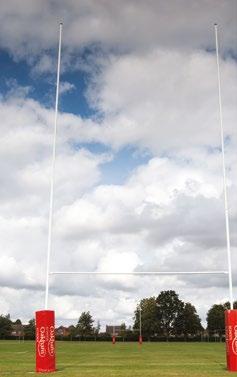
Getting Back on the Pitch

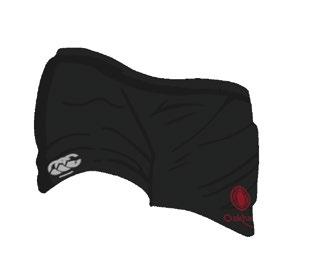


Since Ian first started at Oakham School back in 1995, he’s never seen anything impact rugby as much as Covid-19 has. With rugby coming to a halt during the highest peaks of the virus, it’s been a very challenging time for the sport.
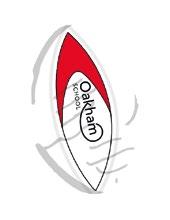
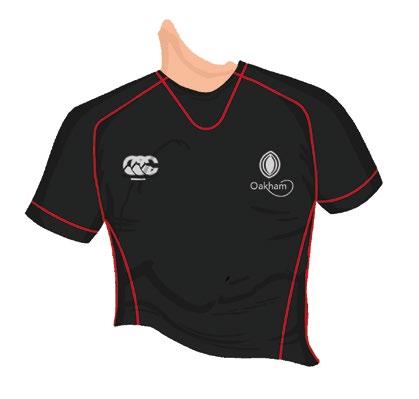
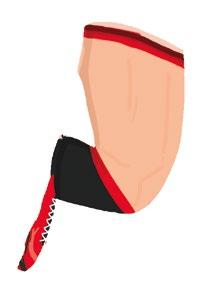
“I was probably more excited for the new rugby season this year than I’ve ever been in my whole career,” Ian says. “Stepping out onto the pitch as a team for the first time since the pandemic has been a very emotional time for us all.”

The biggest priority for the School’s rugby coaches has been getting training back up and running, settling in the new students and preparing them for their fixtures.
Ian says, “Training is vital in all aspects of life – the way we play the game is the way we live our lives – so to have this missing for the past 17 months or so was incredibly challenging for all of us.”
He continues, “Rugby is much more than a game – it’s a love of something extra special in our lives. A lot of our players would say that one of their most special memories from School is running out onto Doncaster Close for the Oakham 1st XV game and moments like this really do stay with people for many years to come.”
36 FEATURE: LIONS AND TIGERS
Doncaster Close
The Lions
Following his tour with the British and Irish Lions in South Africa, Hamish recently revisited the campus to donate two of his Lions jerseys as a thank you for the School’s role in his career.

The first shirt was dedicated to Ian, who taught Hamish during his time at Oakham School. Before Hamish left to play for the Lions, he had dedicated his jersey to Ian in an emotional video where he thanked him for his support.
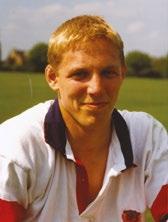
The second shirt was presented to Headmaster, Henry Price, and will now be displayed in the School for parents, guardians and visitors to see.
Ian says: “Talking to Hamish about the Lions tour was very emotional for us both after all of the hard work that he’s put in. I kept in touch with him throughout the tour to see how he was getting on and it was fantastic to have that connection with him.”
“Whenever I watch anyone play that I’ve had the pleasure of coaching, I’m always delighted to see their success, but I do watch with a critical eye.”
“To be a Lions player is the pinnacle of every rugby player’s dream and to see Hamish achieve this and go on the recent tour was just fantastic. For Hamish to put on a Lion’s shirt and make a brilliant contribution to the team made me personally very proud.”
Hamish is the third Old Oakhamian that Ian has coached, who has gone on to play for the British and Irish Lions, following in the footsteps of Lewis Moody in 2005 and Tom Croft in 2009 and 2013.
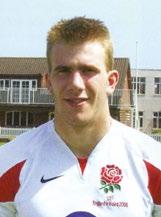
Read about the 30 Lions Ian has coached over the years on page 9 of the Oakhamian
The Tigers
It’s not just future Lions that Ian has trained. For over a quarter of a century, Ian ‘Dosser’ Smith’s coaching influence has helped inspire many Oakham School pupils to go on to play professional rugby – none more so than at his former club: Leicester Tigers.

Oakham School’s connection with Leicester Tigers stretches back to the late 19th century with an impressive number of Old Oakhamian students having gone on to play for one of the Tigers squads. Following a playing and coaching career spent with Leicester Tigers, Ian’s presence at Oakham has only strengthened that connection.
During Ian’s time at Oakham School, he has seen nearly 60 Oakhamians go on to play for one of the Tigers squads, 11 of whom have played for the 1st XV, as well as many who have joined other professional clubs. Drawing on his extensive network of contacts, Ian has also been instrumental in orchestrating the visits of many other former players he has mentored who have come to the School to offer advice and coaching sessions to nurture the next generation of talent at Oakham.
Ian says: “We really enjoy having former players come and coach our current teams – there’s a real mutual benefit to this and the players love coming back to where their careers began.”
“Many Old Oakhamians have said that when they step back onto the 1st XV team pitch, the hairs on the back of their neck stand up. It’s very gratifying when former students want to come back to Oakham and it always makes the School proud to hear that so many players have such fond memories of their time on the pitch.”
Above: Fellow Lions Lewis Moody and Tom Croft, who were coached by Ian
37
We really enjoy having former players come and coach our current teams –there’s a real mutual benefit to this and the players love coming back to where their careers began.
Ian’s Tigers
Written by Aurore Guillomot-Bonnefond, Archivist
Lewis Moody
b 12/06/1978
At Oakham: 1989 to 1996 in Peterborough House then Wharflands and School House.
▀ On 14 September 1996 Lewis became the Tigers’ youngest league player (at 18 years and 94 days). He played for the Tigers until 2010, before moving to Bath. He toured Australia and New Zealand with the Senior England Team in 1998 and played for England U21 in 2000. He won his first full England cap against Canada on 2 June 2001 and went on to win 71 in total. He took part in the 2003 World Cup winning squad – Lewis won the line-out that led to Wilkinson scoring the winning drop goal in the final – and was selected for the British and Irish Lions in 2005. He played for England until 2011, and captained both the Tigers and England teams. He retired from rugby in 2012. He was OO Club President in 2011-2012.
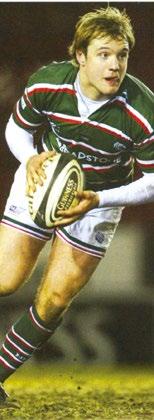
Winter 1990 Oakhamian: “Lewis Moody was a tower of strength at centre especially in defence and has a promising future.”
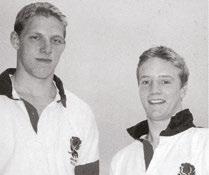
Tom Croft
b 07/11/1985
At Oakham: 2002 to 2004 in Haywoods then School House.
▀ Tom joined the Tigers Academy while at School and played as a flanker in 173 matches with the senior team from 2005 to 2017, scoring 27 tries for the club. He won his first England cap in the 2008 Six Nations and played in the National team until 2015, gaining 40 caps in total. He went on the 2009 Lions Tour to South Africa, scored two tries on his debut and went on the 2013 Lions Tour to Australia. He retired in 2017.
▀ Tom played in Oakham’s unbeaten 1st XV side in Winter 2002 and won the Daily Mail Cup with them in Spring 2003; he was captain of the 1st XV in Winter 2003.
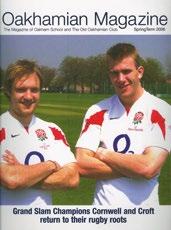
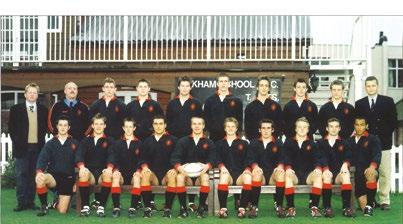
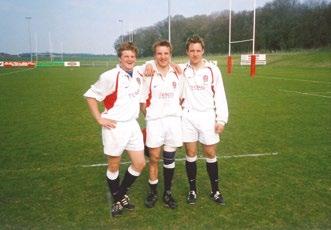
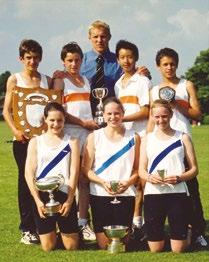
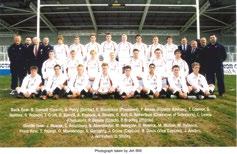
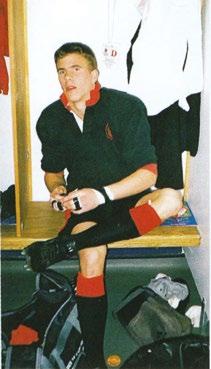
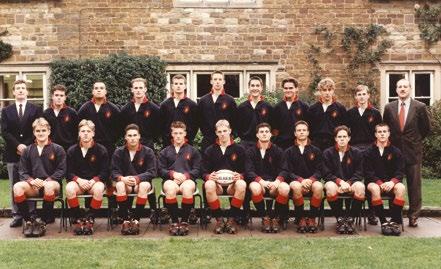
Spring 2003 Oakhamian Daily Mail Cup final report: “Croft who was brilliant throughout the game, took the ball in the line-out and the team work perfected over many years put the captain, Joe Wheeler, over for the first try of his hat-trick.”
Matthew Cornwell
b 16/01/1985
At Oakham: 2001 to 2003 in Clipsham then School House.
▀ Matthew played as a centre for the Tigers for six years, between 2002 and 2008 and came back in 2012–2013. He also played for Exeter Chiefs, Northampton Saints and Mogliano and San Dona Clubs in Italy. He was appointed the Tigers’ 1st team Manager from 2015 and 2017. He is now Head of Rugby Operations at Edinburgh Rugby. He was Captain of England U21.
▀ Played in the unbeaten rugby 1st XVs in Winter 2001 and 2002; played in the Daily Mail Cup winning squad and was a try scorer in the final in Spring 2002 and again in Spring 2003.
Spring 2003 Oakhamian Daily Mail Cup report: “It came from a break by Cornwell, who sold their backs a dummy, after the third phase of forward work had created space.” “Cornwell then put in a high chip and caught it, winning a scrummage.”
38 FEATURE: LIONS AND TIGERS
Matt Smith
b 15/11/1985
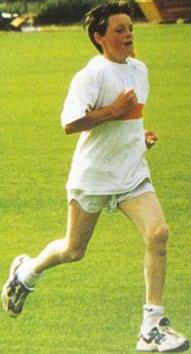
At Oakham: 1997 to 2004 in Peterborough House, Clipsham and then School House.
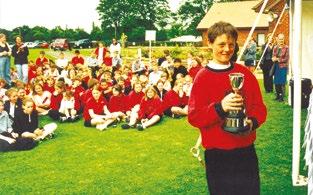
▀ Matt played 228 games for the Leicester Tigers in 14 years, matching the success of his father Ian. He joined the junior academy at 14 and played his first professional match in 2006. He scored 30 tries for the club. He retired from the game in 2019 and is now the 1st team Attack Coach.
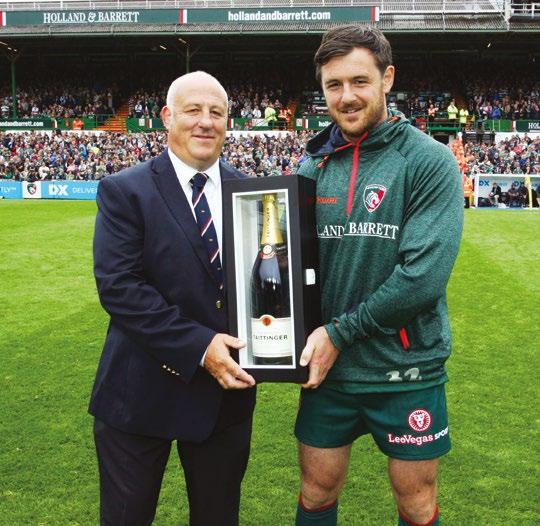
▀ Matt played in the rugby 1st XV in Winter 2002 and Winter 2003 and was part of the Daily Mail Cup winning squad in Spring 2003, scoring a try in the final.

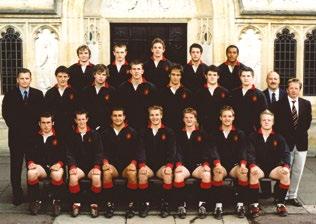
Spring 2003 Oakhamian Daily Mail Cup report: “Matt Smith showed vision and skill to put pressure on the blue and whites, again setting up a period of sustained and inventive rugby.”
Ian’s Influence
Ian has inspired and encouraged many OOs to play professional rugby – for the Tigers and beyond.
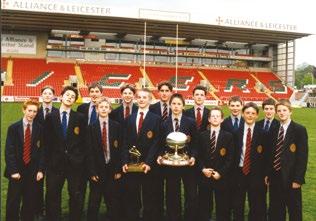
SAINTS TIGERS
58 10 7 4 2 2 2 1
WASPS
QUINS
EXETER GLOUCESTER BATH SARACENS 10 15 5 3
INTERNATIONALS BARBARIANS
ENGLAND TRIALISTS
BRITISH AND IRISH LIONS
39
Ian and his son Matt
DEATH NOTICES
DAVID ALLOWAY (’75)
2 March 1956 – 7 September 2021
WE BADGERY (’50)
29 March 1932 – 4 November 2021
MARY BAGLEY (HON OO, TEACHER AT OAKHAM FROM 1979 TO 1996)
24 July 1936 – 27 October 2021
An obituary will follow in the next edition of the Old Oakhamian magazine.
RICHARD VINEY (’86)
21 March 1969 – 26 August 2021
Obituaries
School in 1988, he continued with his work as a restorer of instruments (and especially a maker of violins, of which he constructed 50). He also taught the violin part-time at Oundle School. He became British Veteran Chess Champion in 1994. He wrote two novels: The Weakest Link and James and the Pixie and poetry: The Complete Poems of Januarius
MICHAEL JOHN HUGGINS (’57)
19 June 1940 – 20 May 2020
Written by Michael’s daugthers, Karen and Julia
GERALD BOTTELEY (HON OO; TEACHER AT OAKHAM FROM 1969–1988)
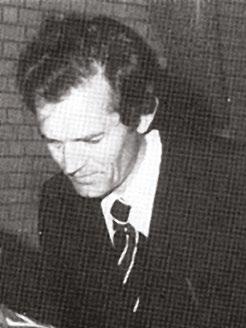
6 January 1933 – September 2021
Written by Brian Needham (Hon OO) Gerald William Botteley joined Oakham School as Head of Strings in 1969; an enthusiastic violin teacher, his arrival heralded an even greater future for the School’s orchestra, as well as for Chess, of which he became Master i/c.
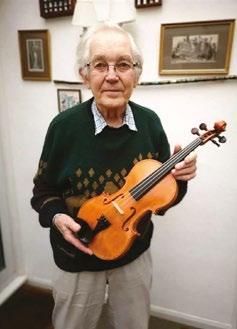
Gerald served in the Royal Artillery Band in Woolwich, having left school at 15, where he met his future wife, Florence, with whom they had four children – Anthony (’82), Mark (’84), Philip, and Sarah (’88); they were married for 67 years. Originally Gerald had been a violin craftsman at Edward Withers in London before teaching (and repairing instruments) at the Leicester County School of Music before moving to Oakham as Head of Strings. Whilst at Oakham, he worked for and gained a Diploma in Teaching from the Royal School of Music. He quickly showed that playing the violin was but a small part of his repertoire: viola, double-bass, trumpet, chess pieces and golf clubs were all instruments over which he exerted skill and a passion which encouraged others to follow. Retiring from Oakham
Michael John Huggins (at Oakham 1952–57) was born on 19 June 1940 at Hinwick Hall near Wellingborough. He was the middle child of three children, with an older brother Maurice and a younger sister Marjorie. His mother’s maiden name was Tyler. Michael joined Oakham School as a day boy in Johnsons in Form Rb, having gained a scholarship from the Vale of Catmose School. He gained Certificate A in the Combined Cadet Force (CCF). After School he went to work for Barclays Bank in Oakham. It was while he was working there that he met Janet Taylor, the daughter of Arthur Taylor who ran the ‘Railway’ pub in Oakham. Michael and Janet married in Leicester in 1960, after Michael had left the bank and had moved on to work for Pedigree Petfoods. In 1961 they welcomed their first daughter Julia, they then moved from Leicester to Melton Mowbray and welcomed their second daughter Karen in 1963. In 1967 their final daughter Susan was born but unfortunately she died soon after birth. When grown Julia became a nurse and Karen married John and gave Michael and Janet five granddaughters, who went on to give Michael and Janet 10 great grandchildren. Michael retired from Pedigree Petfoods in 1986 which gave him time to indulge in his favourite pastimes of golf and stamp collecting. Michael even became Senior Captain in 2009 of Melton Golf Course. Michael had an intracranial bleed in March 2020 and died on 20 May 2020 aged 79, a victim of Covid-19. On the day of his funeral on 8 June, he was followed in death by his widow Janet.
OBITUARIES 40
Nigel Webb, who was Housemaster of School House when David was a Sixth and Seventh Form Tutor and careers advisor, writes: ‘He was an excellent, caring tutor and many Old Oakhamians will be grateful to him for his carefully considered careers advice.’
CAROL BROWNE (HON OO; MATRON IN CHAPMANS HOUSE 1990–2007)
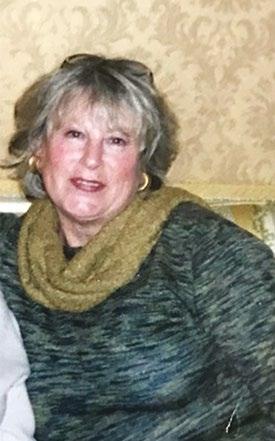 Written by Simon Barefoot (Hon OO)
Written by Simon Barefoot (Hon OO)
DAVID DYER (HON OO; HEAD OF BUSINESS STUDIES 1970–1978)
Written
by David’s daughter, Jeni Burton (née Dyer) (’78)
It is with great sadness that the family of Mr David Hamilton Dyer announces his passing after a brief illness, on 30 April 2021, at the age of 85.
David passed away peacefully in Peterborough City Hospital and will be lovingly remembered by his wife of 61 years, Meg, his children, Jeni, Andy and Simon and his many grandchildren, great-grandchildren and extended family.
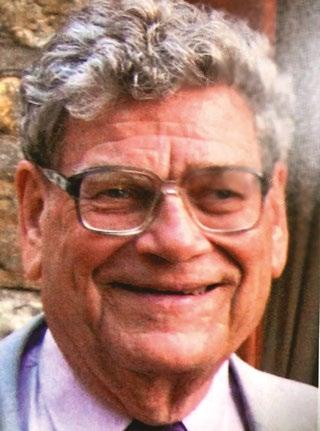
David was a passionate teacher, lecturer and teacher-trainer. He was one of the founders of Business Studies as an academic subject at A-level and authored many textbooks. He was Chief Examiner for various examination boards and made a profound contribution to Business education around the world.
David was a fine Bridge player, reaching the level of a Premier Life Master. He greatly enjoyed his time playing at The Stamford Bridge Club where he had been a member since moving to Oakham in the 1970s.
David taught at Oakham School for many years, introducing Business as a subject, which still thrives today. His impact on the thousands of students he taught and trained will be felt for decades to come.
David was an enthusiastic fan of cricket. He loved coaching and umpiring and enjoyed the game all of his life.
Carol Browne was Matron of Chapmans from 1990–2007, which is an impressive feat by any standards. The adults were very lucky to have Carol as part of a team which was never bettered in our time at Oakham: there were no changes to the structure of caring for our charges throughout my tenure and this stability (impossible now, of course, because things have moved on, not least in the way the role of Matron has developed) was a central part of how we focused on the needs of the pupils. The familiar way of getting things done, dealing with complex issues and simply living with some 60 young adults gave us a much better chance of finding the right kind of care for individuals. If the adults were lucky, then Champanians were particularly well served: Carol’s sitting room was always a welcoming place for those who needed a bit of home comfort: although the boys might have appeared confident and savvy, we all knew that tenderness was at times in short supply in their own world and so having someone on whom they could rely - on an everyday basis when parents were far away - was something no amount of school fees could pay for. It was always notable that Carol took so many things in her stride: boys jumping off the roof, bereavements, getting used to boarding, sewing on name tapes, dealing with sickness, multiple visits to hospitals for routine appointments, how to tie a tie, bed change (that well remembered cry!)… nothing was too small or too big to deal with. Old Boys will have their own list of routine activities dealt with by Carol and then there will be the others where she really made a difference. The smooth running of the domestic side was due to Carol’s management and, again, demonstrated how stability avoided pitfalls.
Carol’s non-judgemental approach is something that those who passed through Chapmans were so used to that it probably didn’t get mentioned much: it was just the way things were, but in a period when some outdated customs were still common in schools, this was a real breath of fresh air and was simply the right way of doing things. I can recall only one failure … but it has to be said that there were cultural complexities involved and since Middle Eastern royalty did not take instructions from women, I had to pass on Carol’s laundry requests as the male in charge!
All those associated with the House remain grateful for what Carol accomplished - with no thought to the amount of time or effort this might entail. There are five or six generations of Chapmanians who will continue to remember Carol’s care and the part she played in their growing up.
41
JOHN MITSON (’47)
28 February 1929 – 24 September 2020
Written by John’s children, Matthew and Sarah
John Mitson was born in Nottingham on 28 February 1929. He started boarding at Oakham at 8 and provided us with a real insight to his school years, shared here as an extract from a memoir written some years ago.
I spent ten years at Oakham, and for eight or more months of the year, I was away from home. It is a period of my life I remember vividly. I do remember after my first term coming home and crying because the dormitory I was in, the leading members of it told me to turn my face to the wall, possibly because they didn’t like my Nottingham accent. My mother said to tell them I am not going to - next term I did just that and was left alone. Fortunately for me, I showed an ability at sport and that was the yardstick for being respected by one’s fellows. In the summer we played cricket and in the winter we played two terms of rugger. I remember my last year at U14’s captaining the rugger side and that year we had a new boy called Ron Jacobs who had never played the game before. He was big and burly and very quick. We used to give the ball to him and tell him to run; he did and just brushed past the opposition. He went on to Senior School and captained the First XV the year before I did and after leaving school he played for
Northampton and then for England. I enjoyed my school life and am not ashamed to say that when I left at the age of eighteen, in the train I cried and cried; I didn’t want to leave.
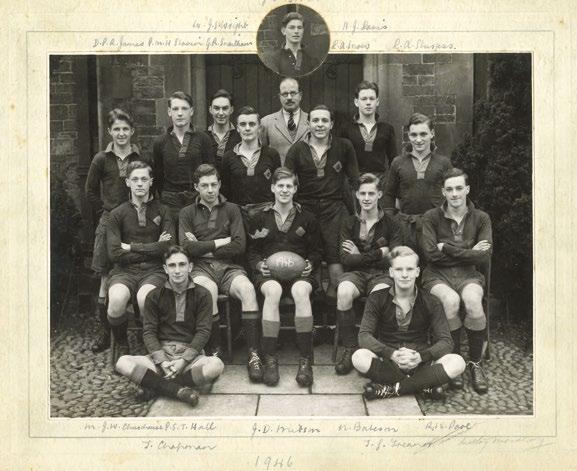
John was persuaded to enlist in the Royal Artillery at 18 by his father, but his heart was never in it, deliberately failing the War Office Selection Board not once, but twice. To see the world, he volunteered for a posting in Singapore where he became a Staff Sergeant with responsibility for manpower and planning. In 1949 he went up to Sidney Sussex, Cambridge on an exhibition to study Law. At college he continued playing sport at the highest level – he captained the college rugby XV and played for University Seconds, also playing for Nottingham in the holidays. But it was not all sport; John studied and had an active social life at Sidney Sussex, meeting his wife Rita whilst at Cambridge. They married in 1954 and moved to London so that John could complete his Law Society finals. He served his solicitor articles for the council in Lincoln, and lived briefly in Plymouth. John moved to private practice when he was taken on at Birketts in Ipswich in 1959.
John was a pillar of the community in East Anglia, holding a wide range of posts in addition to his responsibilities as a partner at Birketts. He volunteered at the Samaritans and was a founder member and President of the Ipswich East Rotary Club. He was a governor at the Convent of Jesus & Mary,
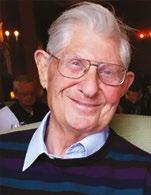
a non-executive director for the Ipswich Building Society and a trustee for many charities, including the Nichol-Young Foundation, St Helena Hospice and Dunton’s Alms Houses in Dedham, the village that John and Rita settled in in 1983.
He was also a family man and enjoyed supporting his four children’s sporting talents and watching Ipswich Town Football Club where he had season tickets throughout the 70s. Once he became a member of MCC in 1978 he became a regular visitor to Lord’s and entertained many friends and family members to some wonderful days of topclass cricket.
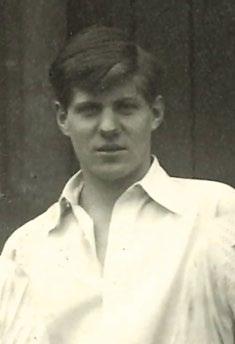
John was an active member of the Church of England, being an elder at the church in Kersey and a church warden at Dedham. He was Diocesan Registrar for St Edmundsbury and Ipswich for 21 years until 1998. After Rita’s untimely death in 1989 he decided to go to Oakhill Theological College exploring ordination, where he met Carol who was to become the second love of his life and who became his wife for a further 28 years. They married in 1992 with his son as best man, and both went on to be non-stipendiary ministers and active grandparents.
John’s life was filled with energy, enthusiasm and love. His nine grandchildren provided moving tributes to a beloved grandfather at the funeral in Dedham Church after John died peacefully at home on 24 September 2020 after a short illness.
OBITUARIES 42
CHRISTINE OLDFIELD (NÉE LINDSAY)
(TEACHER AT OAKHAM FROM 1971–75 AND 1983–86)
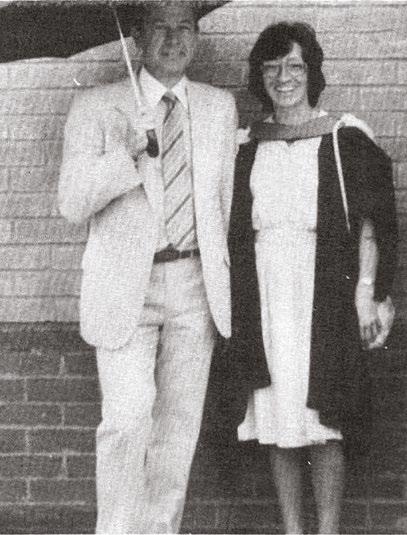 Written by Nigel Webb (Hon OO)
Written by Nigel Webb (Hon OO)
Christine Oldfield who died from a sudden heart problem at the end of December 2020 taught Mathematics at Oakham, first as Christine Lindsay, from 1971–5, and later, when married to John Oldfield, from 1983–6. OOs lucky enough to have been taught by her are likely to remember her as a brilliant, exacting and caring teacher, with a direct and uncompromising personality, Scottish impatience with ‘flannel’, and a powerful intellect which more than compensated for her diminutive size. She will also be remembered by contemporary staff for her enthusiastic advocacy of the rights of female teachers in the early days of co-education at Oakham, for her dry, wry sense of humour, for her skill with crossword-solving up to Mephisto level and for the amazing Burns Night suppers she organised. Retired and living in Nottingham, surrounded by the many long-distance running trophies won by her and John, and their publications on walking and running, Christine was a leading (and dancing) member of The Nottingham Scottish Association, for which she edited the newsletter.
JAMES MARCHANT SMITHIES (’58)
2 February 1947 – 9 August 2021
Written by James’ wife, Chris James was born in February 1947 in Horsforth, Leeds, together with his twin brother, John. He also had a brother Michael, who was five years older and mother, Marjorie and father Jim. James and John arrived at Oakham at the age of 11; James thoroughly enjoyed school life, especially sport.
After leaving School, James trained as a Chartered Surveyor at V Stanley Walkers in Leeds. Following on from School he played a lot of hockey at Ben Rhydding Hockey Club, Ilkley, was very competitive, got many red cards and fell out with several referees but also made lifelong friendships.
In 1974 he got a job at Eddisons in Huddersfield, where he met his wife Chris. Ed was born in 1979, followed by daughter, Pru in 1981. The family moved to Shepley in 1980, where Chris still lives – it has always been an extremely happy family home.
The last 30 years of James’s working life was spent with a colleague and friend dealing in Industrial/Commercial property. He was a consummate speaker, conducting auctions both professionally and for many charities, as well as speaking at events and business meetings. He only retired about three years before he passed away when Dementia really took hold.
James loved holidays. Spring Bank meant Salcombe and when the children were younger France was the destination of choice - home from work on a Friday night, pack up the car and drive to Dover, taking the overnight ferry to France. The sun shone, the children were happy and the wine flowed – brilliant! As the children got older, further destinations became the norm but always
happy, happy times and many memories. James was a founder member of Denby Dale Rotary Club. Apart from raising money for good causes, a great deal of fun was had, especially when the Club had visitors from Australia, South Africa and America, to name but a few.
Rugby was also an important part of James’s life, playing at School and also Roundhay Rugby Club, but his main interest was through Ed who played school rugby (QEGS Wakefield) to a high standard and then at Harrogate Rugby Club. James subsequently became a very active Chairman for many years and then President. Again Dementia curtailed this passion.
Ed married Louise in 2004 and now lives in New Zealand with their two children. We have had the opportunity to visit on a few occasions, which was wonderful, the long journey not so much!! Pru married James in 2010 and lives near Wakefield with their two sons. The grandchildren added much joy to James’s life.
James also loved the three Labradors we have owned over the years. The current one, Fudge, couldn’t understand why her beloved master often failed to recognise her when she visited the care home, where unfortunately James went to live for the last 18 months of his life.
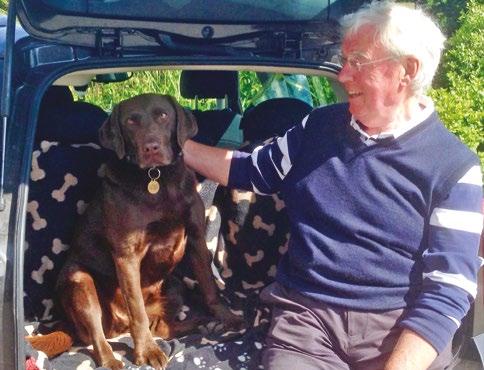
The family were inundated with cards and messages when James passed away – these were the common words used to describe him: Generous, Supportive, Hard working, Booming laugh, Large smile, Proud family man and a True Gentleman
He retained his innate good manners to the last and the care home christened him the Smiling Gentleman. He certainly was and also was much loved.
43
ROBERT STEVENS (’52)
8 June 1933 – 17 January 2021
Written by Sir Peter North (’54)
Robert Stevens came from Leicester and was at Oakham for six years from 1946–1952, his school career culminating in his being appointed Head Prefect in 1951. Whilst Robert would never claim to have been an athlete, he made a range of contributions to life in the School in other, sometimes more sedentary, ways. He excelled at shooting and made a major contribution to the CCF, being promoted Under Officer in his last year. Indeed his interest in both debating and acting boded well for his chosen career as a lawyer. He was one of the Oakham generation of sixth form historians who owed so very much to Bob Duesbury, a number of whom, including me, also went on to become lawyers.
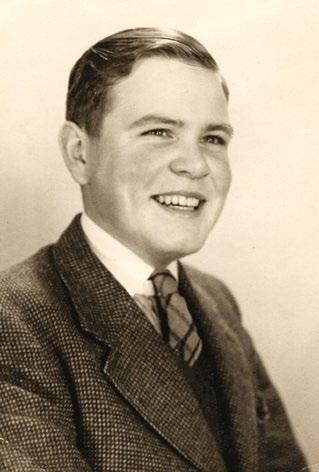
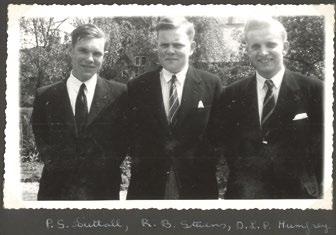
From Oakham, in 1952 Robert went up to Keble College, Oxford to read Law, no doubt guided in that direction by Bob Duesbury, Keble being his old college. After four years in Oxford, including a final year studying for the BCL, he accepted a oneyear appointment as a Teaching Fellow in the Law School at Northwestern University, in Chicago – footsteps in which, again, I followed a few years later. After a short period back in England as a young barrister, teaching Law at Keble at the weekend, the lure of America was too great and he headed back there to an appointment at the Yale Law
School where he stayed as a Law Professor for over fifteen years.
As a legal scholar, Robert was more interested in how the legal system operated in society rather than in detailed analysis of minute points of law. It is no surprise that one of his most highly regarded books (out of the dozen or so that he wrote or edited) is In Search of Justice: Law, Society and the Legal System, written quite early in his career jointly with Brian Abel-Smith – an early examination of what is called “Law in Action”. His analytical skills were, however, far from limited to discussion of legal issues in a university classroom, having also been of Counsel in a major US law firm for many years.
Excellent Law Professor that he was, his abilities as a university administrator became obviously apparent and, in 1976, he moved to the very senior post of Provost at Tulane University, a move followed in a couple of years by his appointment as President of Haverford College in Pennsylvania; and after nearly a decade there he then served as Chancellor of the University of California at Santa Cruz. However, after nearly thirty years in the USA it was clear that Oxford had not lost its attraction and in 1993 he succeeded Sir Roger Bannister as Master of Pembroke College, spending the next eight years skilfully guiding the College through a significant period of change, as well as ensuring that the coffers were reasonably well filled; and it was at Pembroke that he
hosted a quite splendid 90th birthday lunch for Bob Duesbury and his sister, Doris. Ever the generous host and cheerful friend, Robert was someone to whom I felt that I could always turn for shrewd advice. Although in his last years Robert became increasingly less mobile, he did have the compensation of seeing his wife, Kathie, making her own contribution to the law as Chair of the Oxford bench, and of their daughter, Robin’s, flourishing career as a children’s novelist. Reflecting on his contribution to the study and practice of law, and to higher education, both in this country and the USA, Robert must be regarded as one of the most distinguished Oakhamians of modern times; and he was forever grateful for the debt that he owed, in particular, to Bob Duesbury.
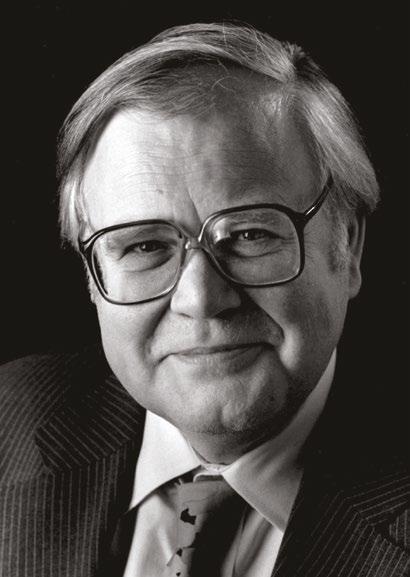
44 OBITUARIES
Lives Remembered
TOM GRANT (’05)
15 years since Tom’s passing, and after a two-year Covidinduced break, the 12th Annual Tom Grant Football Festival, held in memory of Tom Grant (‘05), took place at the School’s Wilson Fields on Sunday 19 September. Twelve Houses competed in the friendly House competition, all striving to win the Champions League replica trophy. The Senior Boys Tournament was a largely competitive one, with Chapmans finishing deserved winners. The Junior Boys winners were Barrow, holding off a spirited Haywoods to the end. The Junior Girls Tournament was taken home by Hambleton.
A solid performance by Buchanans in the girls’ matches helped them edge past Stevens and they were crowned the overall winners and were the recipients of the Champions League replica trophy.
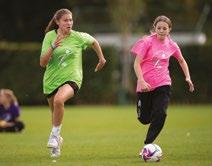
Glenn Gelderbloom, Housemaster of Haywoods and joint organiser of the event, said, “The fun and enthusiasm etched on the faces of boys and girls alike paid a fitting tribute to Tom, and it shall remain a tournament that always produces the greatest moments of football and allows people to connect as a community.”
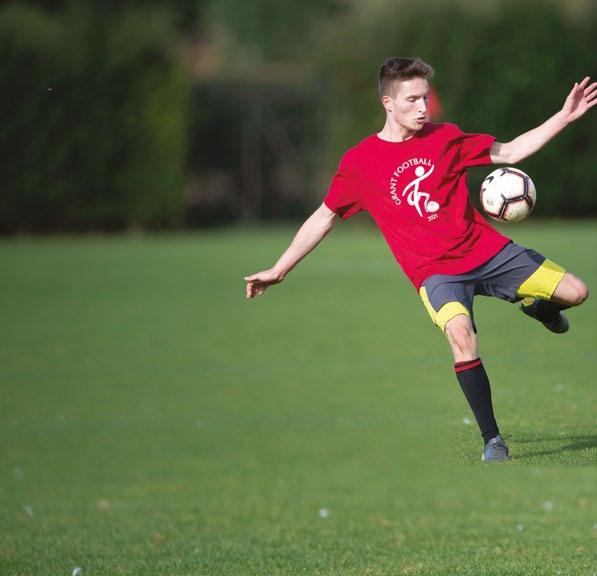
Mr and Mrs Grant also passed on a message to pupils and staff before the event, “We hope you have a successful and enjoyable festival, with a barrowload of goals! Thank you for taking part. We’d also like to offer a special thank you to all those members of staff who have given their time to organise the festival. Tom would be delighted with this event.”
FREDDIE GROOME (’13)

Freddie’s legacy continues in the form of a business activity for Form 6 pupils. Generously supported by Freddie’s parents and classmates, the Freddie Groome Enterprise Activity will provide would-be entrepreneurs the chance to develop a product, receiving a small initial investment and mentoring, before selling their wares on a special market day in the Summer Term.
Freddie’s friends also fundraised for a beautiful magnolia tree, which is planted next to the canal cricket net and Rushebrookes House.
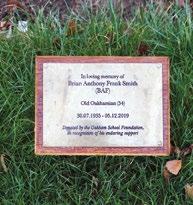
If you are interested in being involved as a mentor in the Freddie Groome Enterprise Activity, please contact Joe Roberts at jr@oakham.rutland.co.uk
FRASER GRAHAM (’99)
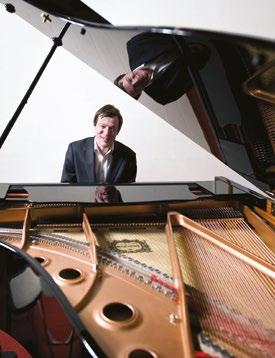
Family and friends came together to celebrate Fraser’s memory with a memorial concert featuring some of his favourite pieces held in Oakham School Chapel on Thursday 23 September. The concert began and ended with recordings of Fraser playing the piano. Fraser’s brother, David, played piano with a number of the performers, and Fraser’s young son Toby played the opening to the Moonlight Sonata. Friends, colleagues and students of Fraser’s also played and sang pieces which reminded them of Fraser and his boundless love for music. It was a beautiful concert filled with wonderful performances, and a fitting tribute to a talented musician and lovely man from those who knew him best.
BRIAN (BAF) SMITH (’54)
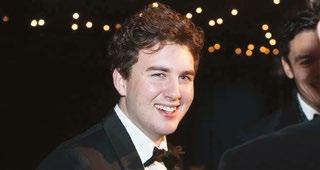
On Friday 18 June, the family of Brian (BAF) Smith (‘54) gathered on Doncaster Close, nearby the BAF Smith Pavilion, to plant a tree in memory of Brian. The liquid amber tree, which will turn a beautiful shade of crimson each autumn, will serve as a lasting symbol of Brian’s longstanding affinity for Oakham School. During the planting, OO Club President Jon Wills (‘73) talked about Brian’s commitment to Oakham School. Former School Chaplain Brian McAvoy also delivered a blessing. Family members in attendance were: Mrs Jill Smith, Mr Graham Smith, Mrs Sharon Smith, Mrs Sheila Turner, Mr Duncan King, Mrs Julia Grundy and Mr Ian Grundy.
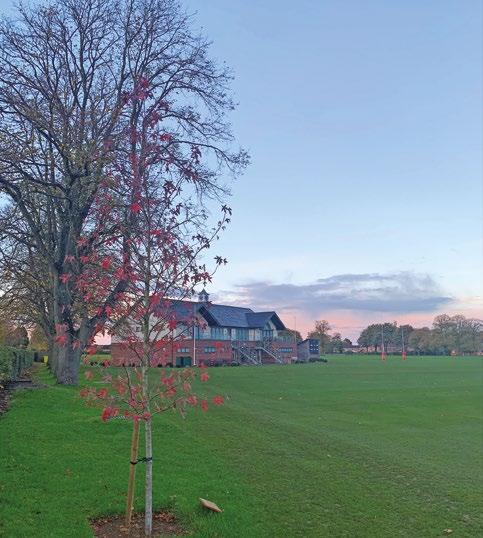
We would love to hear from you!

We are always looking at ways to improve the way we communicate with Old Oakhamians and really appreciate you taking the time to answer this short questionnaire.

1 What content do you enjoy reading about?
2 How often would you like to hear from the OO Club and in what format?
3 What events would you like to attend?
4 If you were to donate to the School, what projects would you like to support?
5 Would you be willing to pay to receive a hard copy of The Old Oakhamian magazine?
Many thanks, Samantha, Joe, Asha and Charlotte Oakham School Development Team
in touch with our OO Community online: Become a member of our busy OO Facebook Page Follow us on the OO Instagram Page Sign up to The Oakham Hub for help with your career: www.thehuboakham.com Keep in touch with the latest OOs news via the OO newsletter
Keep
Scan this code or email us: OOClub@oakham.rutland.sch.uk

































 Stuart Broad.
Above: Tom Fell.
Right: Lyndon James
Stuart Broad.
Above: Tom Fell.
Right: Lyndon James













 Harry Glynn
Dingle Yandell, photo by Michal Novak
Harry Glynn
Dingle Yandell, photo by Michal Novak









 Written by Emily Howett
Written by Emily Howett



 Written by Joe Roberts
Written by Joe Roberts









 Mike Stevens, Teacher at Oakham School 1957–1993
Above: Michael Stevens.
Right: Photographs sent by Richard Hope With Alison Hattersley (1971-1972) and outside Old School in summer 1970
Mike Stevens, Teacher at Oakham School 1957–1993
Above: Michael Stevens.
Right: Photographs sent by Richard Hope With Alison Hattersley (1971-1972) and outside Old School in summer 1970



 Left: The 17 boarders in College House, 1971
The Girls 1st tennis VI, 1972
Mrs Buchanan (top) and Mary Stevens (bottom)
Left: The 17 boarders in College House, 1971
The Girls 1st tennis VI, 1972
Mrs Buchanan (top) and Mary Stevens (bottom)


 Below: Rev Terence Treanor and his daughter Elizabeth (above)
Below: The first contingent of girls in the CCF, 1973
A letter by Elizabeth Treanor, reflecting on her first term at Oakham, published in the Winter 1971 Oakhamian:
Below: Rev Terence Treanor and his daughter Elizabeth (above)
Below: The first contingent of girls in the CCF, 1973
A letter by Elizabeth Treanor, reflecting on her first term at Oakham, published in the Winter 1971 Oakhamian:






 Top: Lincoln House (1986)
Above: Buchanans House informal photograph (1978)
The newly built Sports Hall (1972)
Above left: C.J. Palmer playing squash
Above right: The first five girls boarding in Orchard Close (1975)
Top: Lincoln House (1986)
Above: Buchanans House informal photograph (1978)
The newly built Sports Hall (1972)
Above left: C.J. Palmer playing squash
Above right: The first five girls boarding in Orchard Close (1975)









 Left: The orchestra (1990s) Right: Society membership cards (1970s)
Kwamé Ryan in Dido & Aeaneas (1989)
Girls going on a D of E expedition (1992)
The musical Joseph (1975-1976)
A CCF camp
Iceland expedition (1979)
The 1976 Shooting team
Left: The orchestra (1990s) Right: Society membership cards (1970s)
Kwamé Ryan in Dido & Aeaneas (1989)
Girls going on a D of E expedition (1992)
The musical Joseph (1975-1976)
A CCF camp
Iceland expedition (1979)
The 1976 Shooting team




















 Written by Richard Wright (’75)
Written by Richard Wright (’75)




























 Joe Roberts
Joe Roberts














































 Written by Simon Barefoot (Hon OO)
Written by Simon Barefoot (Hon OO)




 Written by Nigel Webb (Hon OO)
Written by Nigel Webb (Hon OO)










